The Ultimate Guide To Easy Container Gardening
Container gardening is the best way to get gorgeous yields of flowers, a bounty of veggies, and fruit and it’s so much easier than planting and weeding, and harvesting traditional gardens! In this post, there is EVERYTHING you need to know about container gardening.
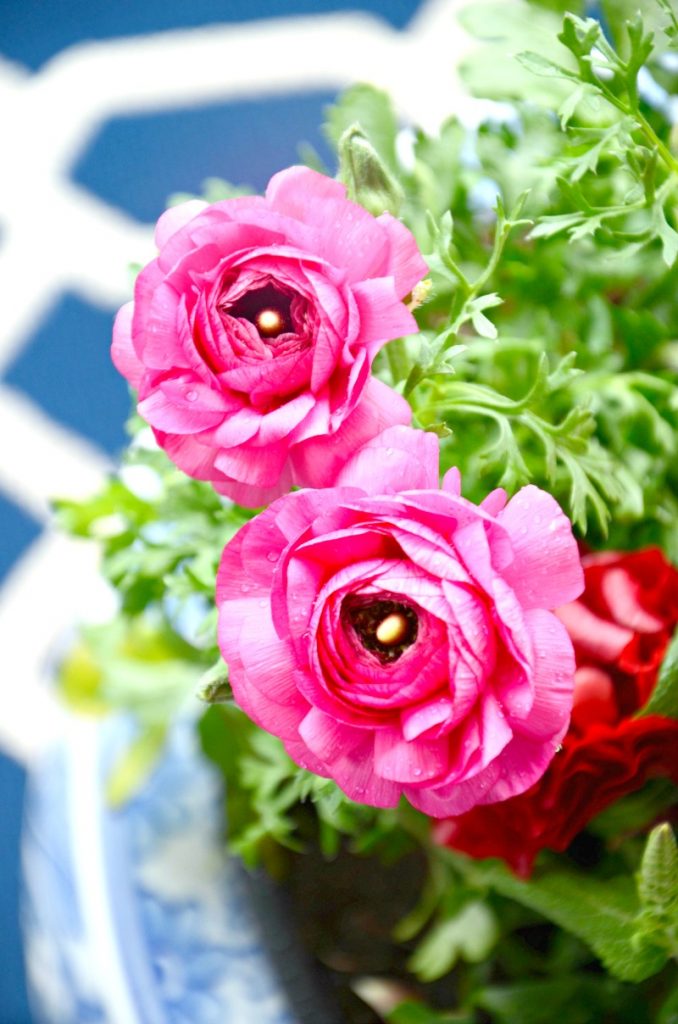
Container gardening is the perfect way to add a splash of BIG color to your porch, patio or any outdoor space. Let’s talk about EVERYTHING you want and need to know about how to container garden! And it’s all in one place!
This is an exhaustive post with just about everything you would ever want to know about container gardening! It’s long and informative. Make sure to pin it and use it as a reference!
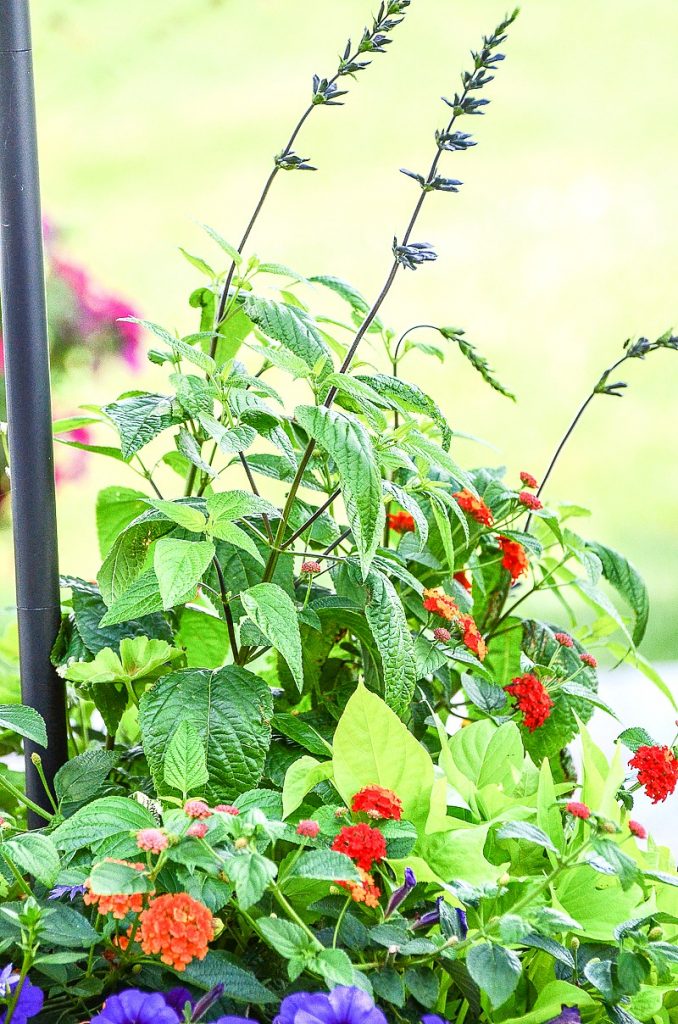
Even if you don’t have a green thumb you can container garden! In this post, I have packed all kinds of know-how, tips, and little professional tricks to help you create and keep a container garden from early summer right through the fall!
First, let’s start with a good working definition…
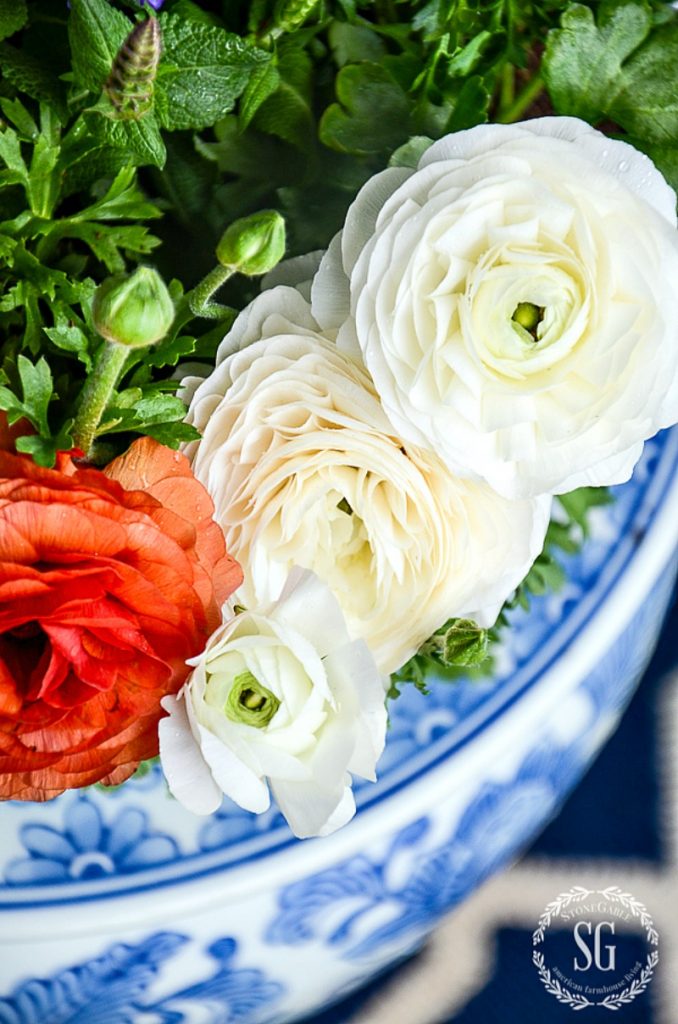
Container gardening is the method of planting flowers and edibles in some sort of container instead of in the ground. These containers can be portable or stay in one place and are a mini-environment for all the plantings in them.
Easy definition! And a great overview! This type of gardening is easy to do and maintain and it will bless you with season after season of beauty!
Let’s look at everything you need to know about container gardening…
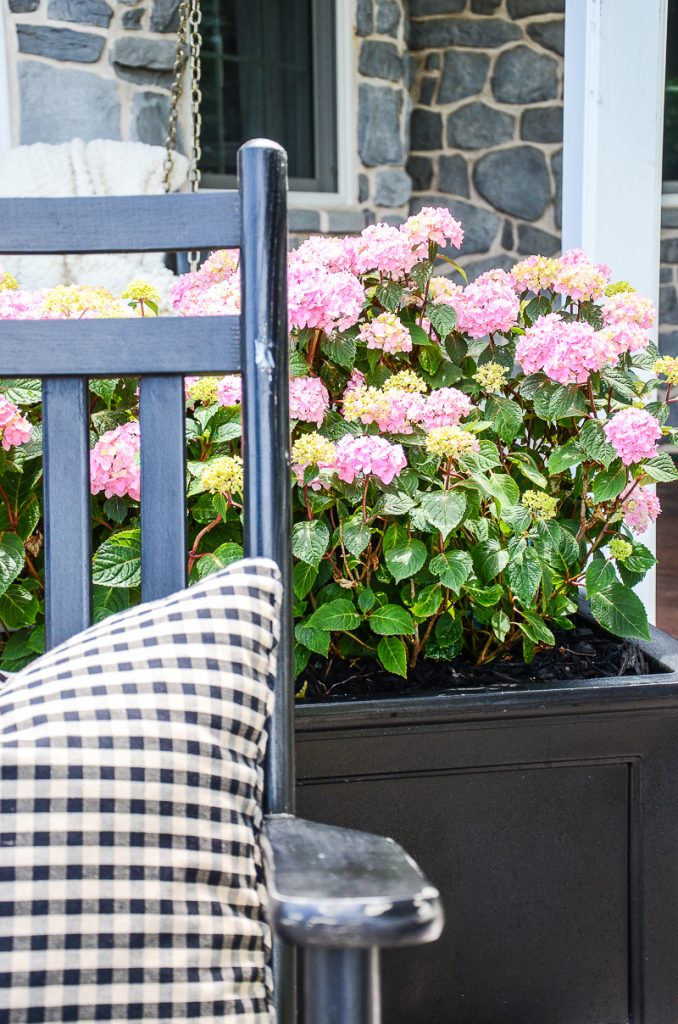
THE CONTAINER
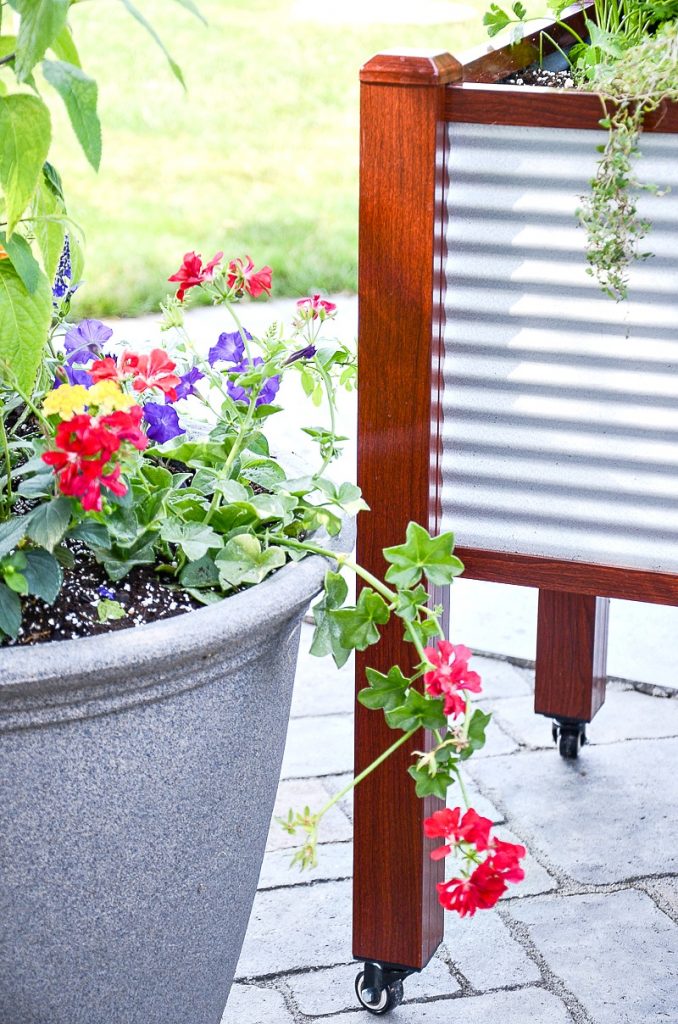
It’s good to start with the container! Your little garden needs a contained environment to grow!
TYPES OF CONTAINERS
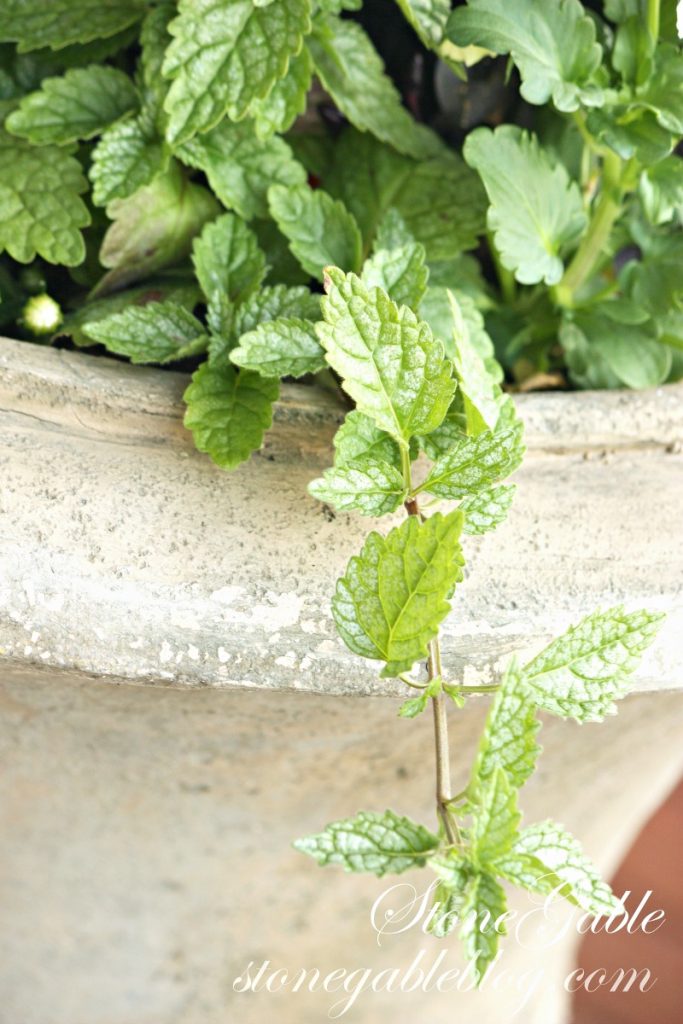
Choosing the right container for your site and growing plants is so important!
There are so many different types of containers for your garden. The traditional terracotta pot comes to mind! But there are so many things you can plant flora in. Here are just a few examples…
- pots
- tubs
- baskets
- stationary structural containers
- hanging pots
- barrels
- metal containers
- concrete containers
- galvanized tubs
- birdbath
- wooden box
- raised beds
- more!
Plantings should be put in a pot so they have room to grow. Most container plants, with the exception of cacti and succulents have longer root systems that like to stretch out without being pot bound!
Make sure the container you choose for your micro garden has enough height and width to let the plants grow!
See how to make this PRETTY CONTAINER for an herb garden!
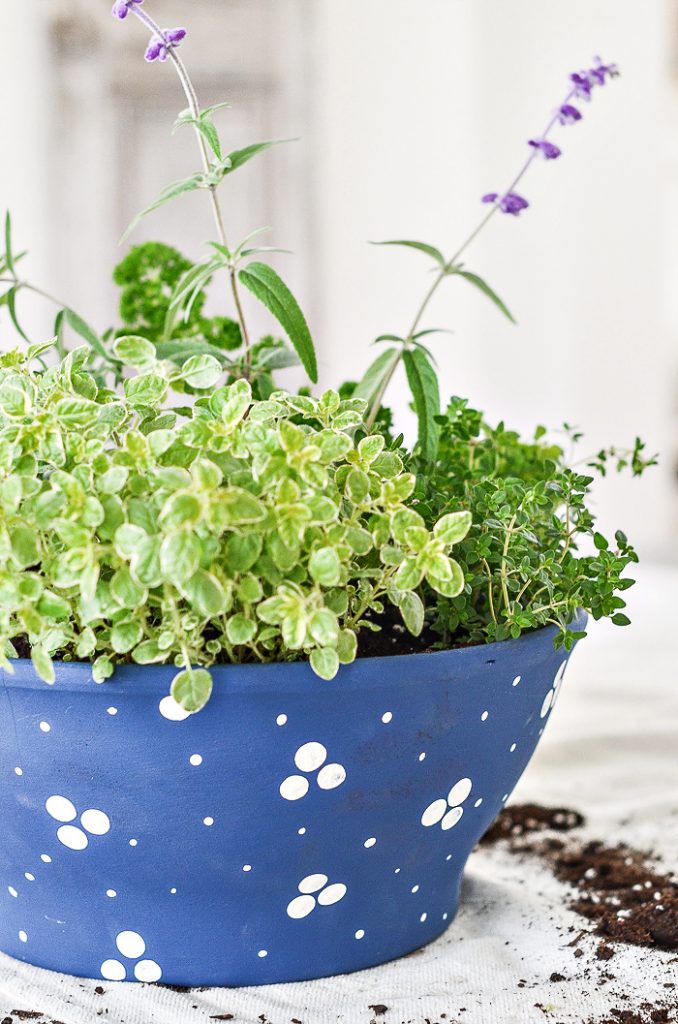
CONTAINER CONSTRUCTION
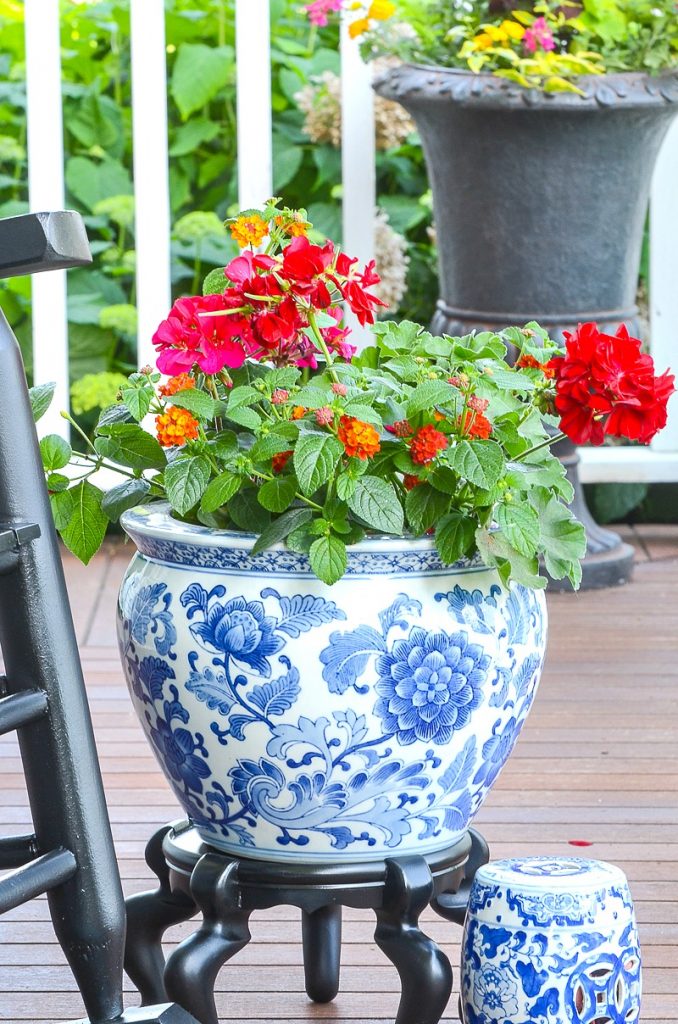
The pot, planter or whatever you choose to plant a small garden in should be sturdy and able to stand up to the sun, wind and other elements of nature.
The more a container is unprotected from the elements the more imperious it should be.
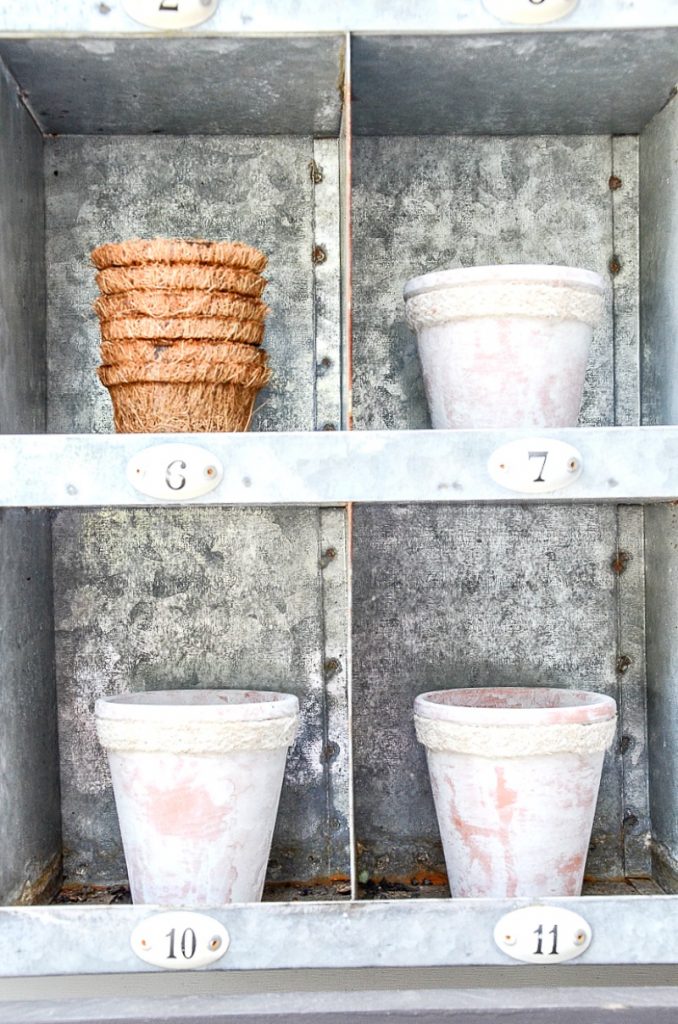
Here are a few popular materials for a planter…
- heavy-duty plastic
- terracotta
- fiberglass
- fiberglass blends
- concrete
- hypertufa (light concrete)
- dark plastic bags
- metal
- wood
- bucket
- polyurethane foam
- ceramic
- more
Each type of pot has its good qualities and it’s not so good qualities. It’s important to match the temperature zone in your area with the right container!
Be creative! Pots and containers for your plantings come in so many shapes and sizes.
TYPES OF CONTAINERS FOR DIFFERENT USES
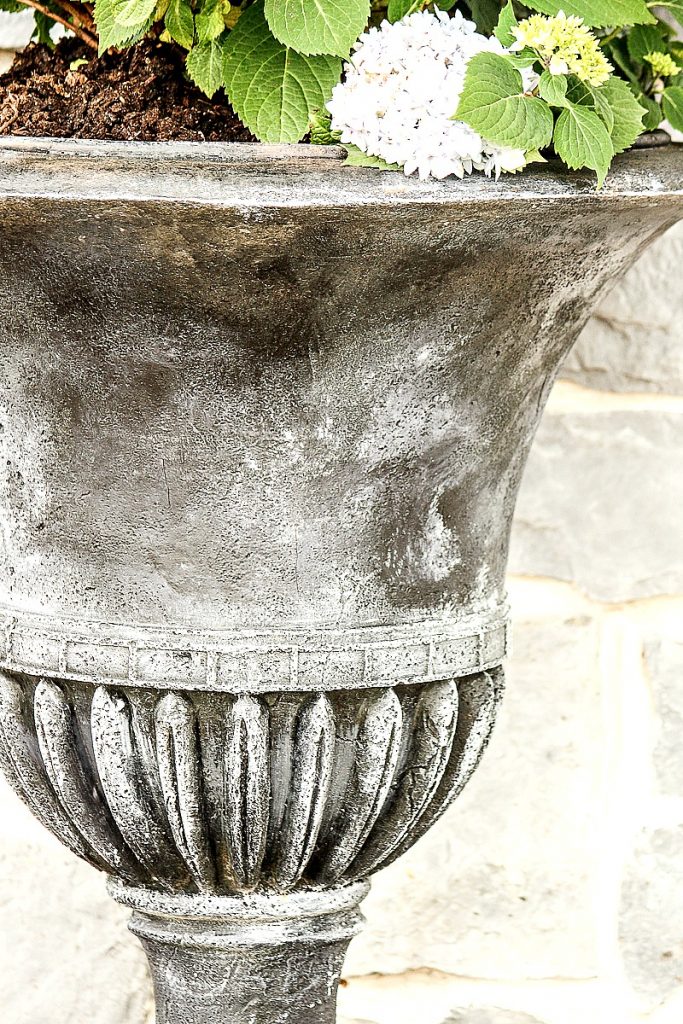
POTS
Pots and planters are any decorative containers no matter what the shape. They are synonyms!
But to make it easy we are going to use the common meaning of a pot. Any round container for a self-contained garden.
The major benefit of a round container is that it looks beautiful from any angle. Round pots work best on patios and where they can be viewed 360 degrees.
But, don’t limit yourself! If you like round pots at a front door, like I do, then use a pot! Round pots are probably the most versatile of all garden containers!
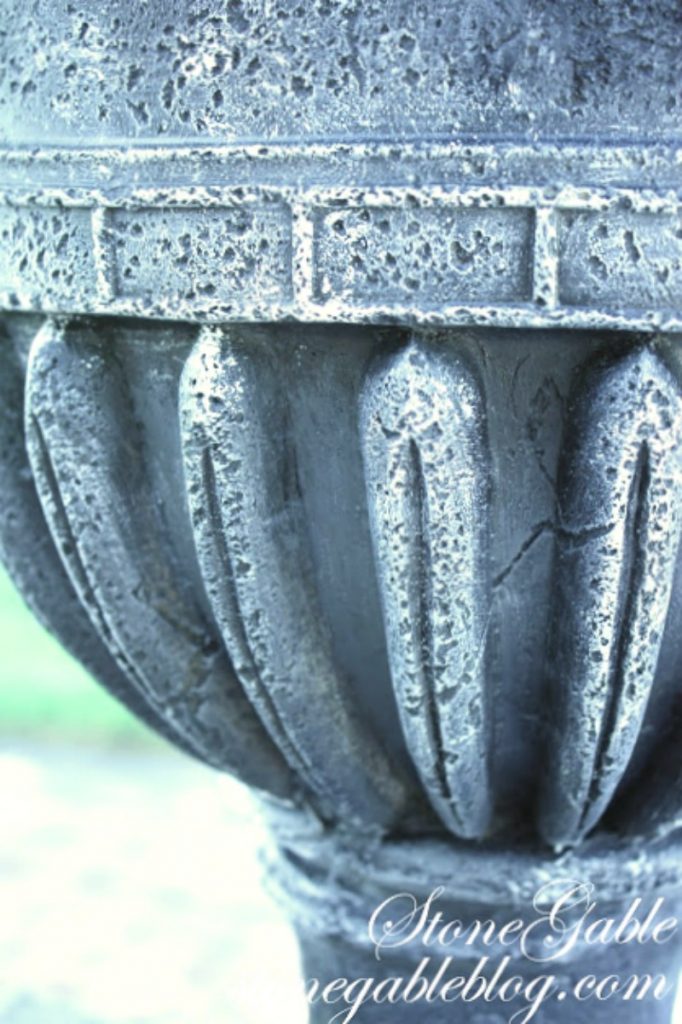
I used chalk paint to transform an old grey pot to look like it had years of beautiful pertained age on it!
See HOW TO AGE A POT OR URN WITH PAINT HERE.
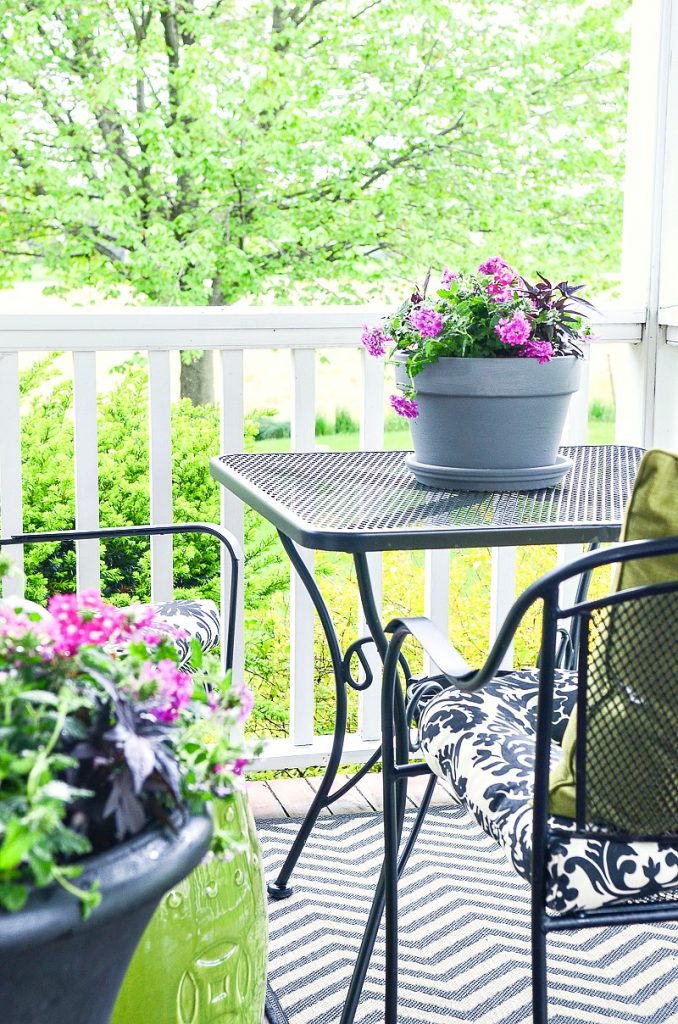
When I think of a “pot” I think of a container that does not have to stay in one place.
Any small outdoor space can turn into a fabulous living area. See lots of tips and inspiring images at CREATING A SIMPLE OUTDOOR SPACE like the one above HERE.
PLANTERS
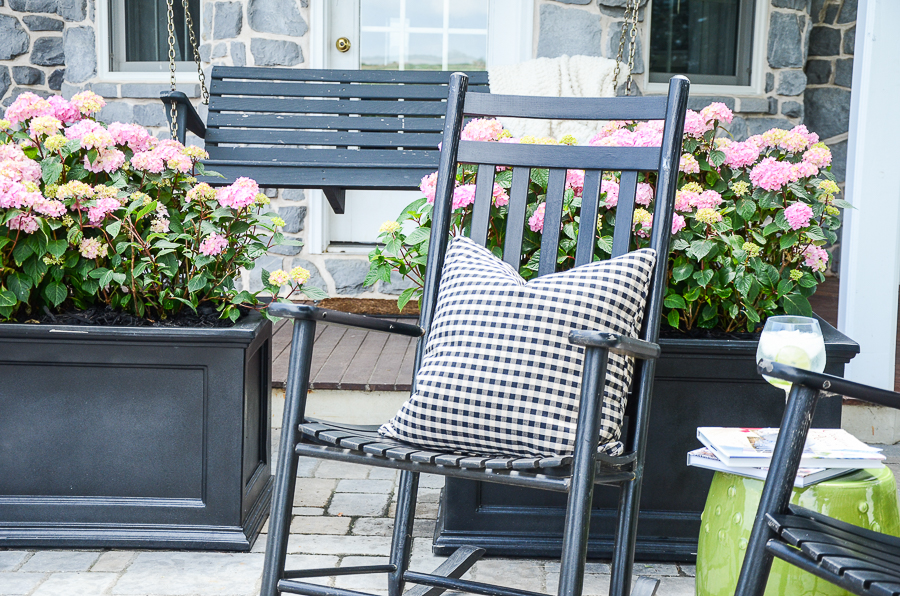
Planters like I said earlier, is the generic name for a planting container but here let’s define it as a pot other than round and something that is usually not moved.
Planters make wonderful “dividers” or natural screens for a patio etc.
I have a trio of large black, self-watering planters on the patio that separate the porch from the patio.
If you love the idea of having gorgeous hydrangeas all summer long in planters on your porch or patio you will want to see HOW TO PLANT HYDRANGEAS IN POTS AND PLANTERS.
This post has everything you want to know!
RAISED BEDS
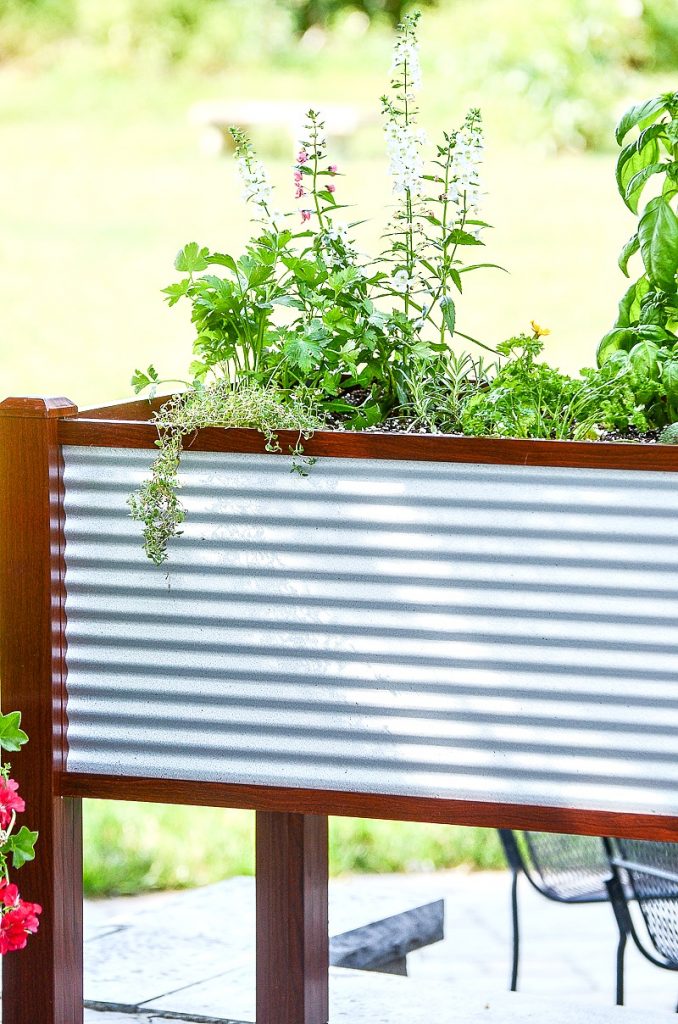
Raised beds are planters, mobile or not, that are raised off the ground at a comfortable height for planting.
They are very popular right now and often are used for patio vegetables and herbs as well as flowers!
And raised bed container gardens are a personal favorite of mine! Here is a post about HOW TO PLANT A KITCHEN HERB GARDEN IN RAISED BEDS.
I’ve planted kitchen gardens in the ground, in a plethora of pots and in raised beds!
HANGING BASKETS
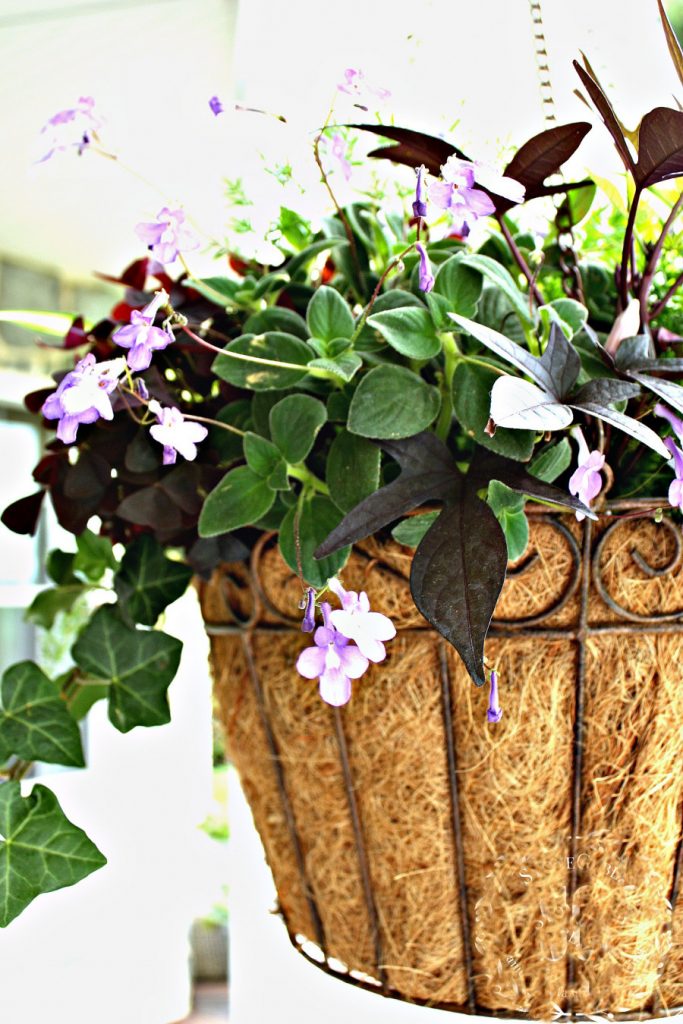
Hanging baskets are planted containers that hang from posts, iron hooks, porches, trees and more.
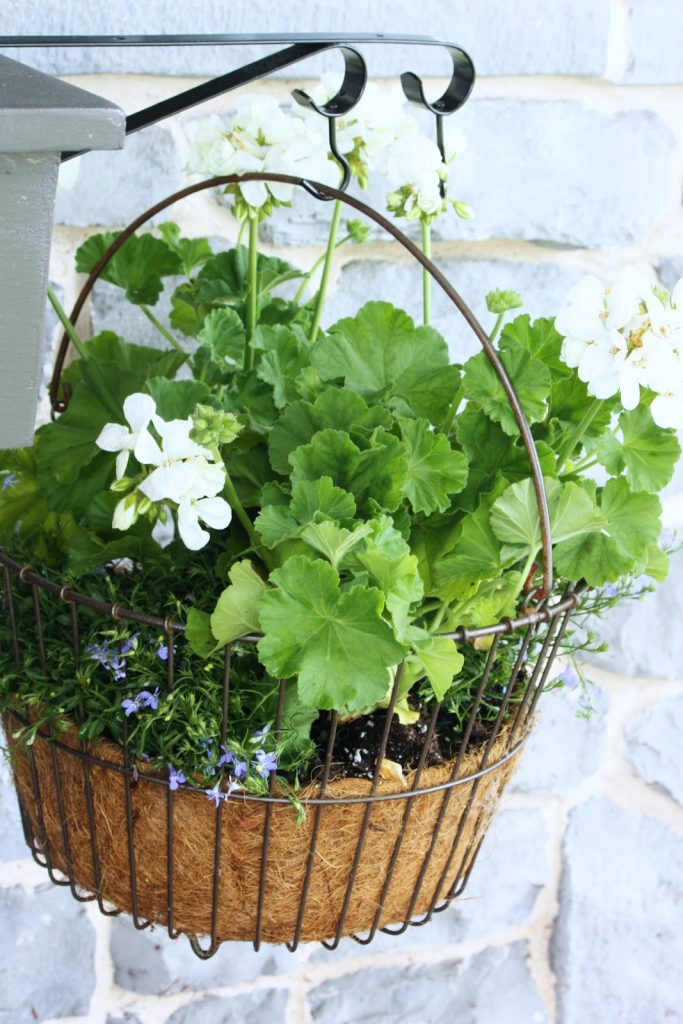
Their contents spill out over the sides of their container and bring colorful height to our outdoor living spaces.
SELF WATERING
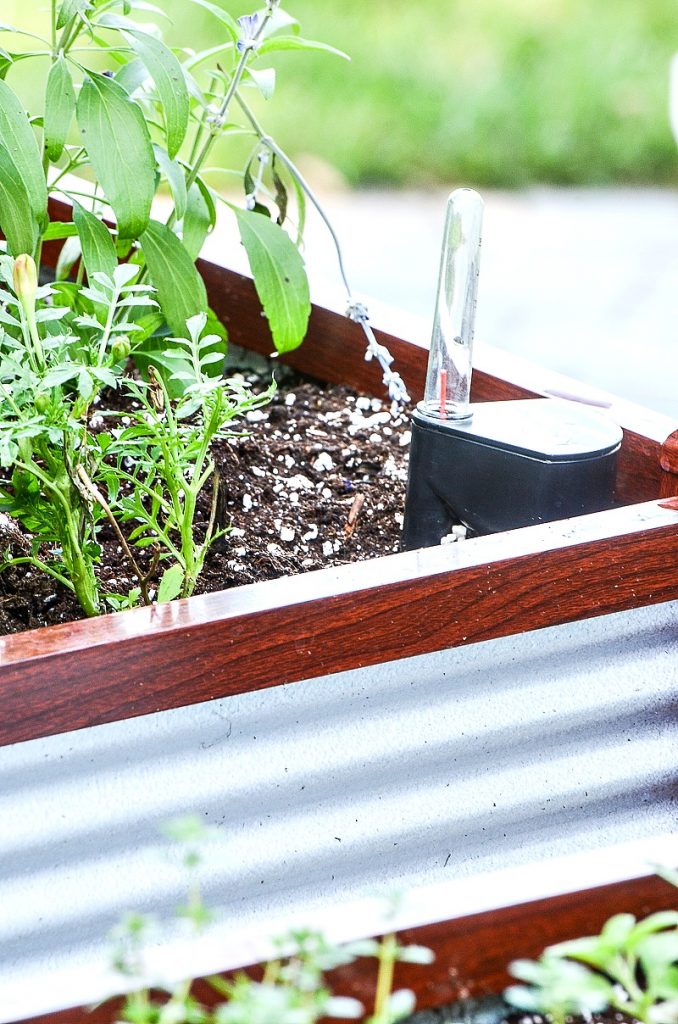
I personally, LOVE self-watering pots and planters! If all the flowers or edibles in the pot need the same amount of water these pots can water their own pot from a reservoir in the bottom of the container!
These containers are low maintenance and keep your flowers perfectly watered for a long time!
Self-watering pots are especially nice when a container gets full sun and water from the soil evaporate quickly. They are also perfect for “thirsty plants”!
TOWER GARDENS
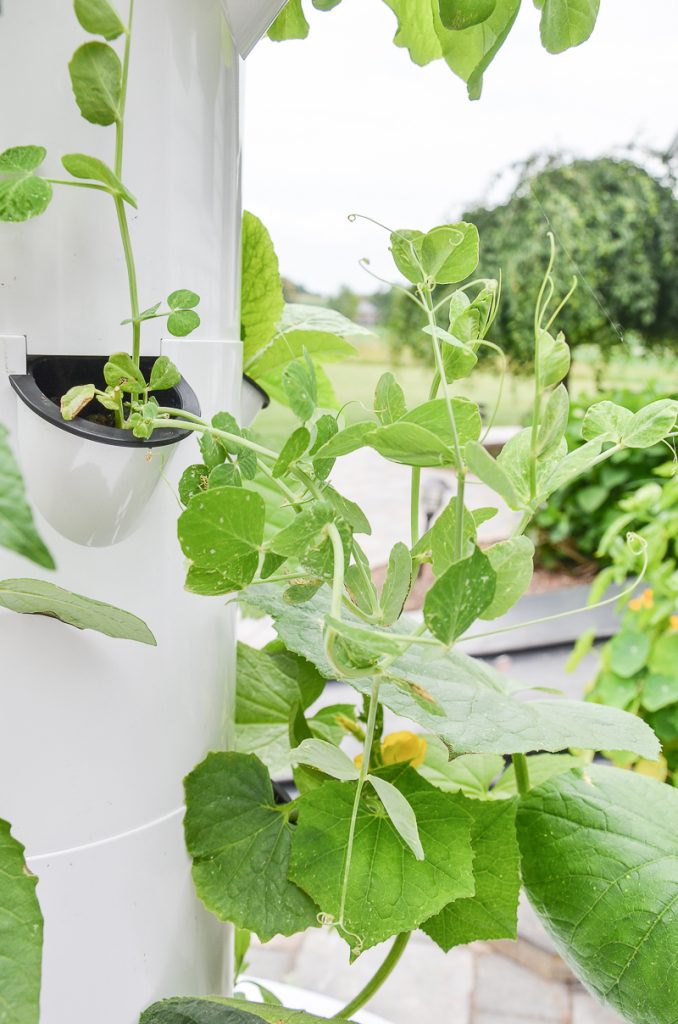
Tower gardens are a fabulous way to grow produce in small spaces. They take advantage of vertical space and hydroponic growing conditions. They are organic and oh, so delicious!
Even though we have the space to grow veggies I LOVE how prolific a tower garden is!
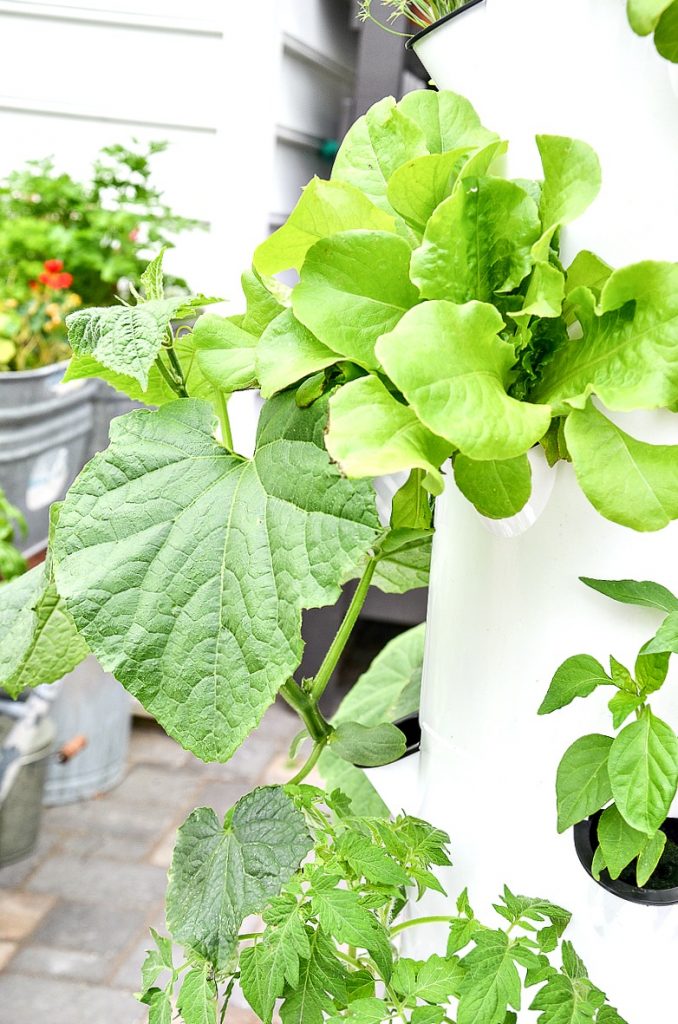
You can find out more about tower gardens HERE.
Also, see FUN FUNCTIONAL TOWER GARDENS where we show you how we put together and use our tower garden on our patio!
PAINTING CONTAINERS
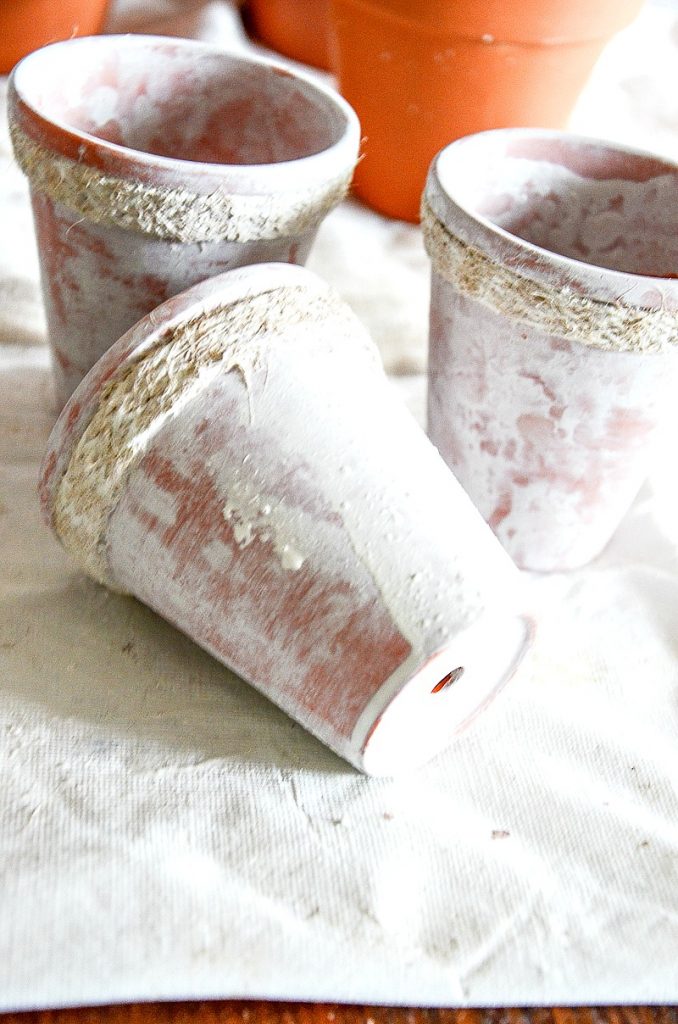
Many pots, urns, planters etc can be painted to work with the flowers and other color palettes in an outdoor space.
I’ve painted and repainted so many containers using chalk paint and spray paint!
The two rectangular planters filled with hydrangeas in the images in this post used to be a terracotta color. I spray painted them with a flat black spray paint that had a primer built in. Who knew, right! So easy!
And I painted the small terracotta pot with the pretty pink flowers with chalk paint here. My favorite one is HERE.
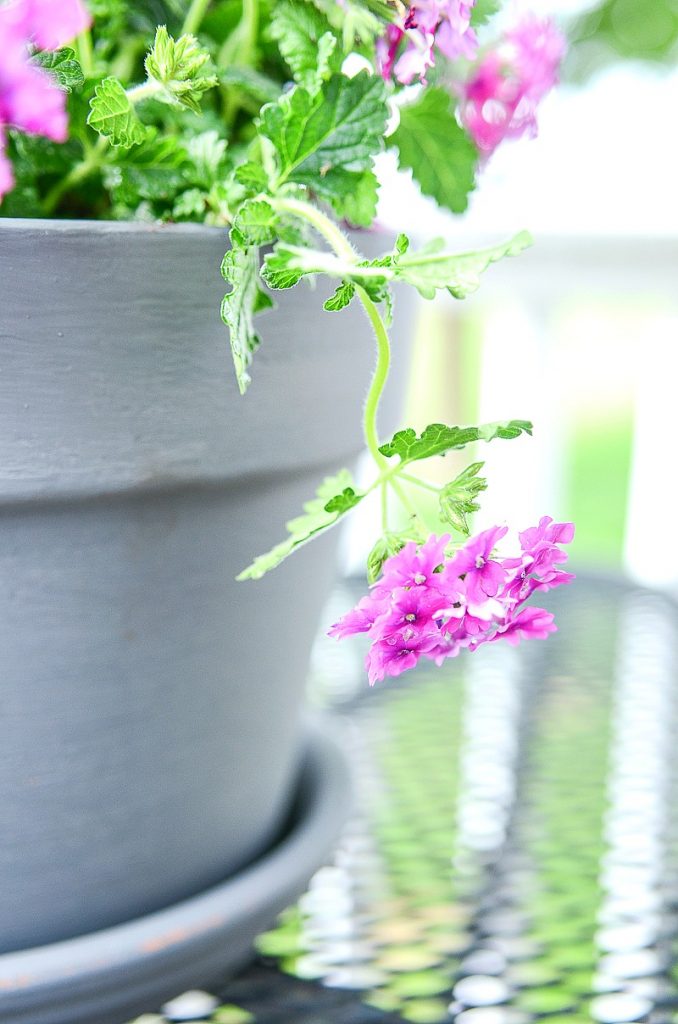
See HOW TO WHITEWASH A POT HERE.
And HOW TO AGE AN URN WITH PAINT HERE.

OTHER IMPORTANT THINGS TO KNOW ABOUT CONTAINERS
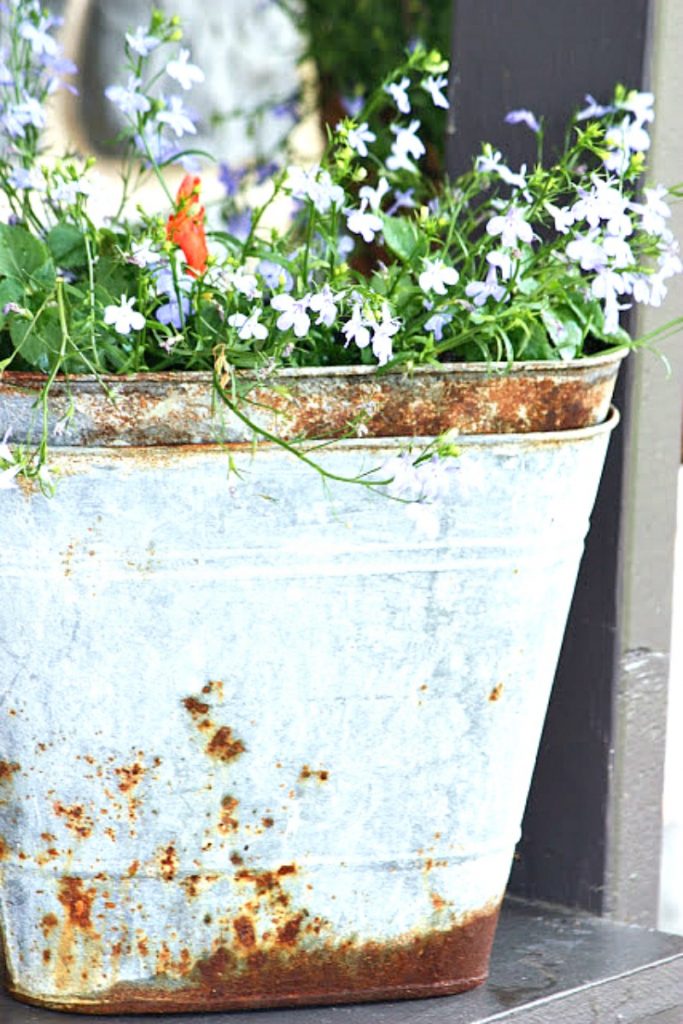
- Use a thin layer of newspaper in the bottom of a planter to keep the soil from seeping out of the drainage holes
- Inspect a container for signs of wear
- put containers in a place that promotes plant growth and health.
THE CONTENTS OF A CONTAINER GARDEN
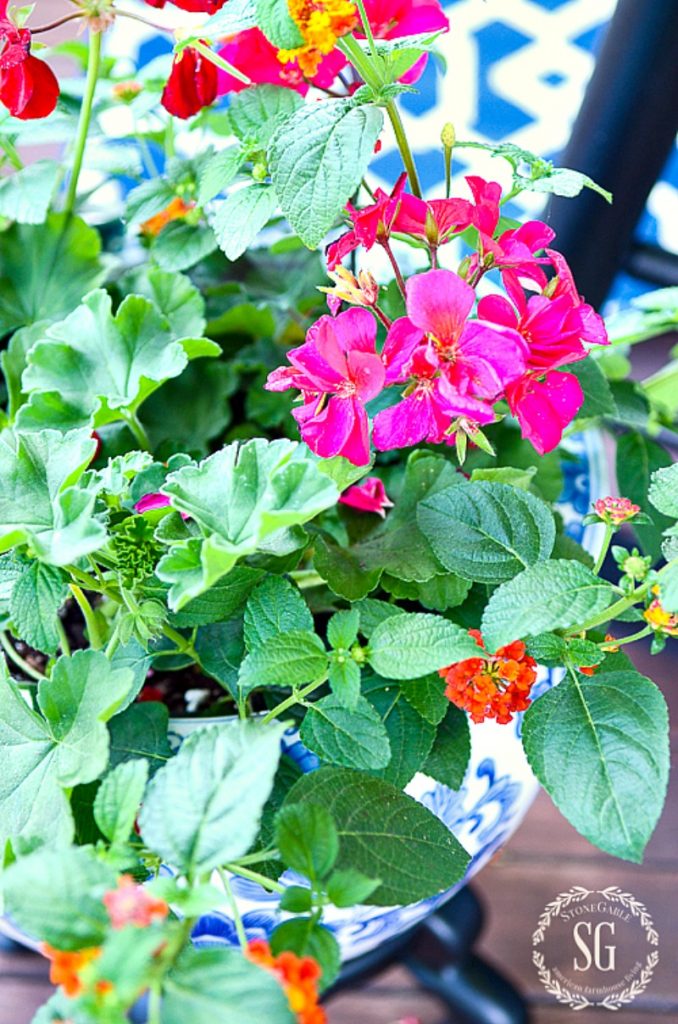
SOIL
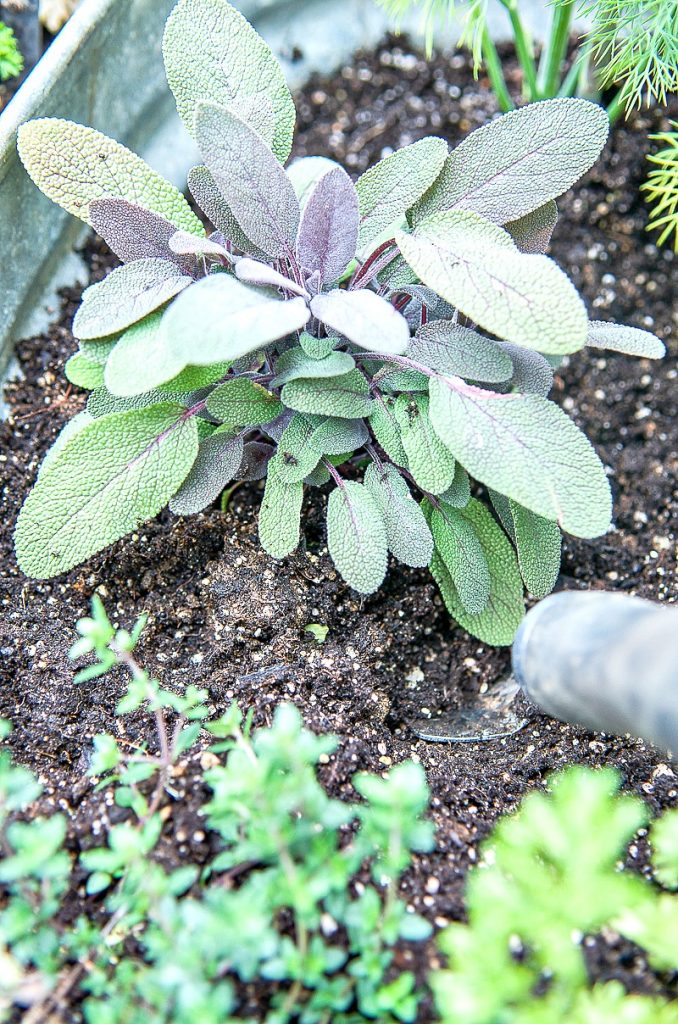
Good soil for a container garden is the basis for a growing, thriving plant! Good container soil brings air, water, and nutrients to the plants.
That is why regular garden soil does not work well in a container pot. The soil is too heavy and does not leave enough air and space for the plants. It also does not drain well.
The best soil for a container garden one specifically meant for container gardens from your local nursery.
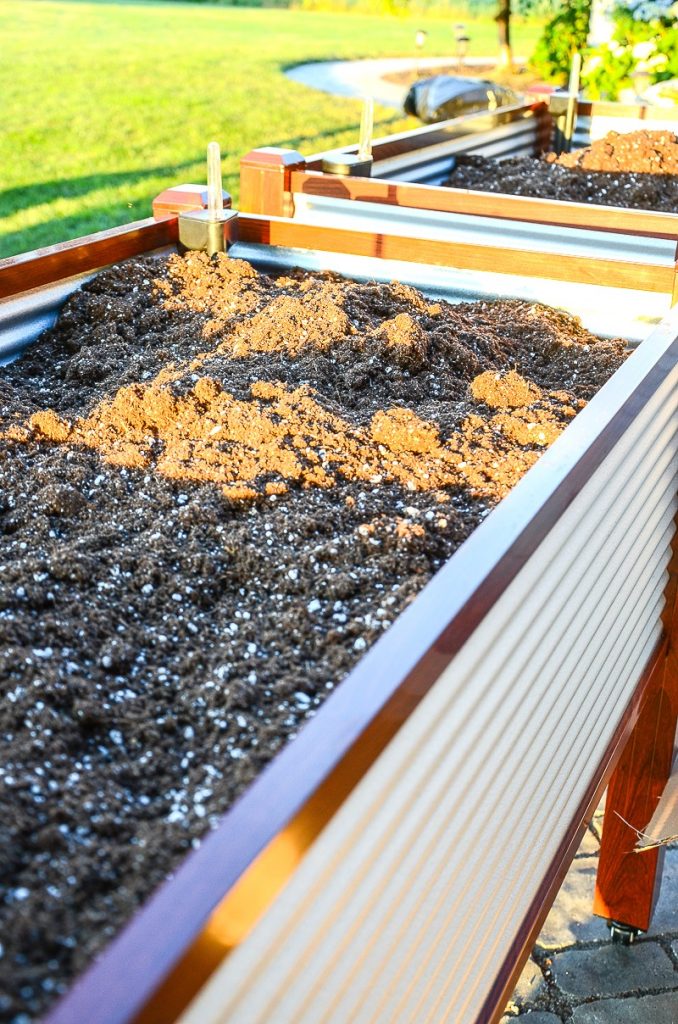
These soils usually are mixed with perlite, vermiculite or other clusters. They add air and capture nutrients that they leach back into the soil for the plants to feed on.
Organic material is usually a part of a potting soil mix. It holds water so the soil won’t dry out.
There is soil for container gardens that have materials that are super water conductors and hold lots of water and release the water as the soil dries out.
Many potting soil varieties have a timed release plant food in them too. This plant food can usually last all summer long.
Other types of soil are actually “soil-less”. Many varieties rely on sphagnum moss and other water retaining materials. Some plants can even be grown in an aquaponic environment. They rely on water infused with rich nutrients to grow. My tower garden is a great example of aquaponic gardening.
One sure way to guarantee a pretty container garden is to use the best potting soil available to you!
DRAINAGE
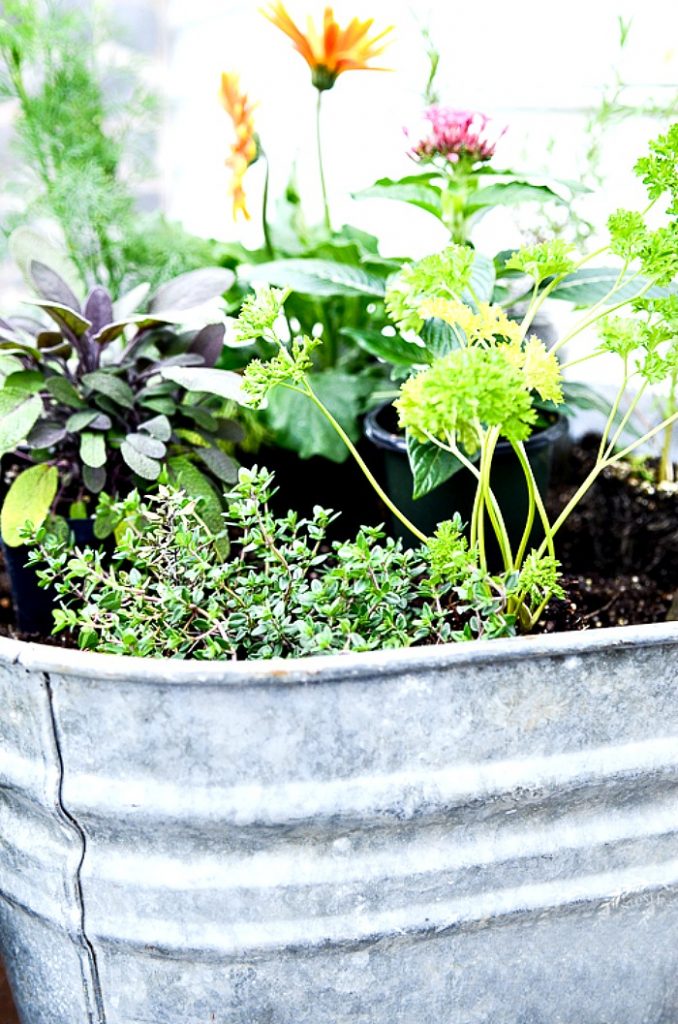
A container garden needs good drainage. Many a plant has drowned because a pot did not have a way to drain the water away from the roots of a plant. The roots will rot!
Yes, plants need a drink of water but not a bath!
Making sure a pot has good drainage hole is the best way to protect the plant from root rot. If you can, drill several holes in the bottom of a pot if a container doesn’t have any!

Not every pot has drainage holes or can be drilled. So fill the bottom of a container with waterproof bits and pieces so the water can pool there and slowly evaporate.
Here are some things you might have around your home to use in the bottom of a container to create a place for the water to go…
- small stones
- empty plastic flower containers
- packing peanuts
- plastic drink bottles washed out
- plastic milk bottles washed out
- styrofoam take out container washed out
The goal of drainage is to let the water pass by the roots of a plant so they can drink up the water and any nutrients it carries without letting the roots of the plantings sit in it.
ANNUALS, EDIBLES AND MORE
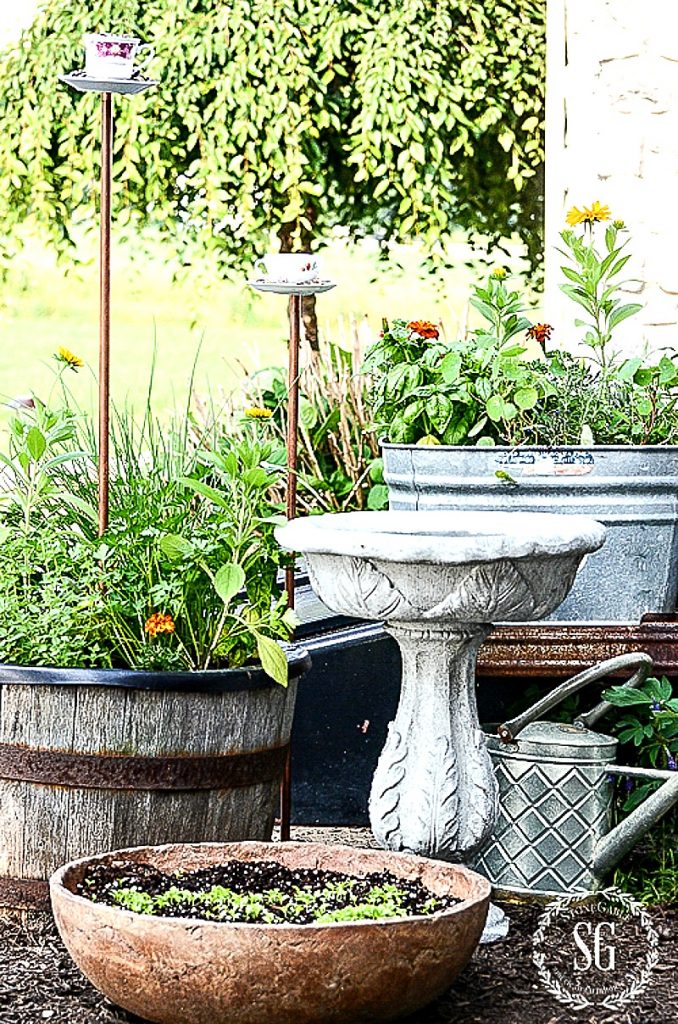
Now for the fun part of container gardening! Let’s choose what to put our pots, urns, planters and other containers! There are so many things to choose from.
The goal is to fit the plants to the area! Shade, sun, partial shade. Zone 6, zone 2, arid, and humid are all things to take into consideration.
Here’s a great tip…
Use the plants that are being sold in your local garden stores! They usually only carry what will thrive in your area!
ANNUALS
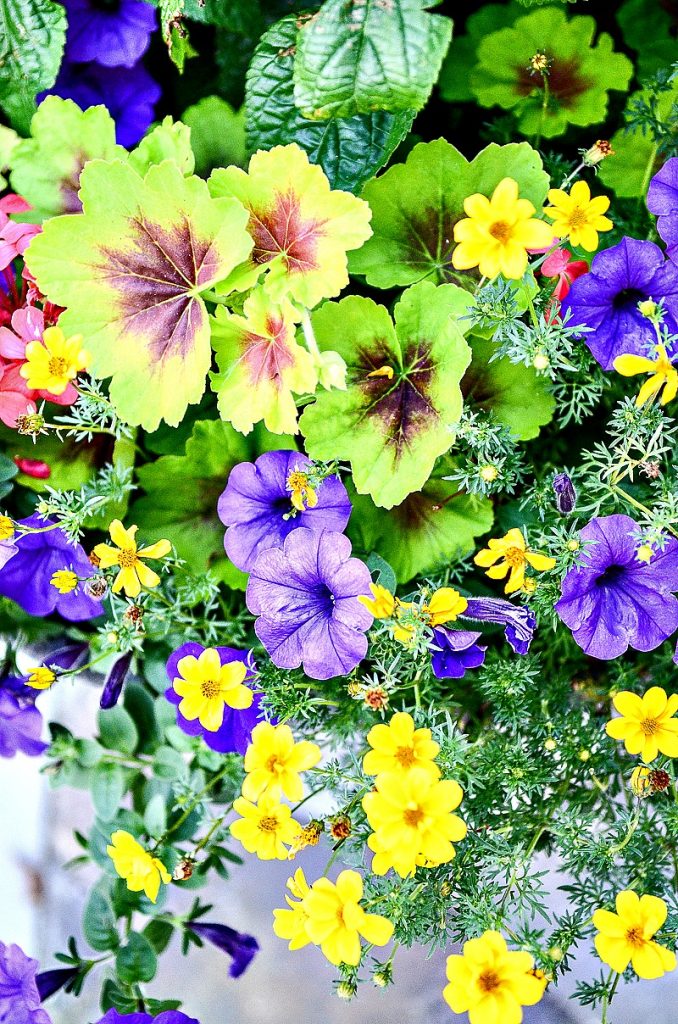
Annuals are plants that grow and bloom for a season and then are done. The great benefit of annuals is they keep on blooming! They are showy and lots of their energy goes into the producing pretty flowers!
Once the season comes to an end these big produces begin to get tired and die.
So if you want a season of stunning blooming flowers pick annuals!
I plant big pots of annuals on my patio and front porch every summer. In THE ANATOMY OF A POT are lots of ideas for planting annuals.
For a summer container garden you can’t beat a planter filled with showy annuals!
HERBS
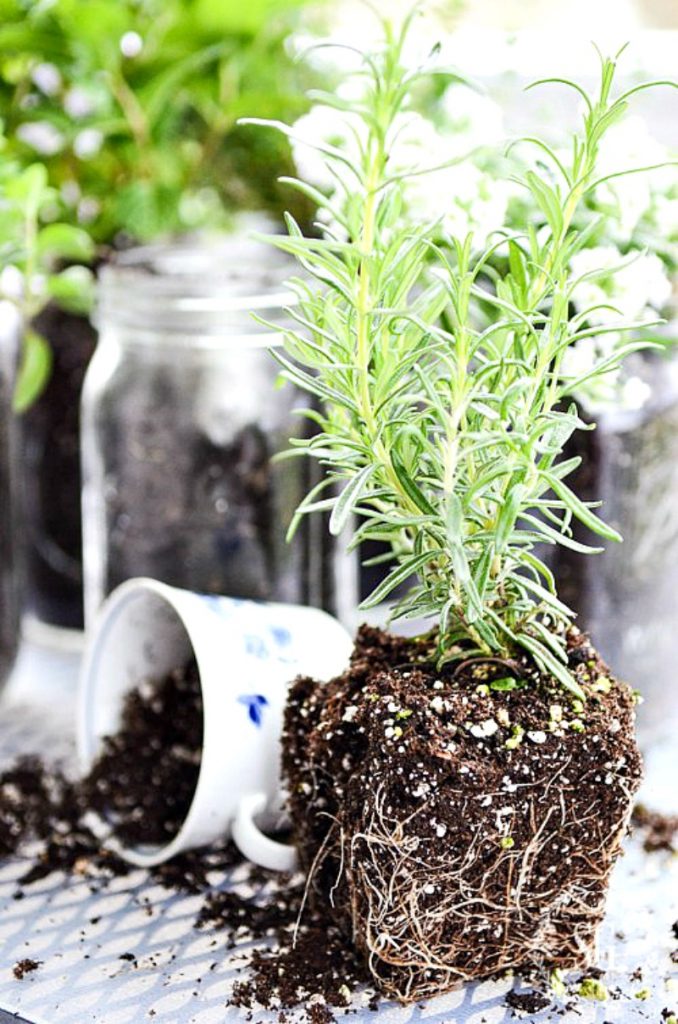
Herbs are a particular favorite of mine. Most herbs do flower but that is usually a sign they have been neglected and not snipped or pinched off . The beauty of an herb is in it’s gorgeous, aromatic leaves!
Most herbs can be planted together and need full sun! They are quite hardy and respond well to lots of snipping. The more you snip off the leaves to use the more they thrive!
Depending on your location some herbs winter over well and can be considered perennials.
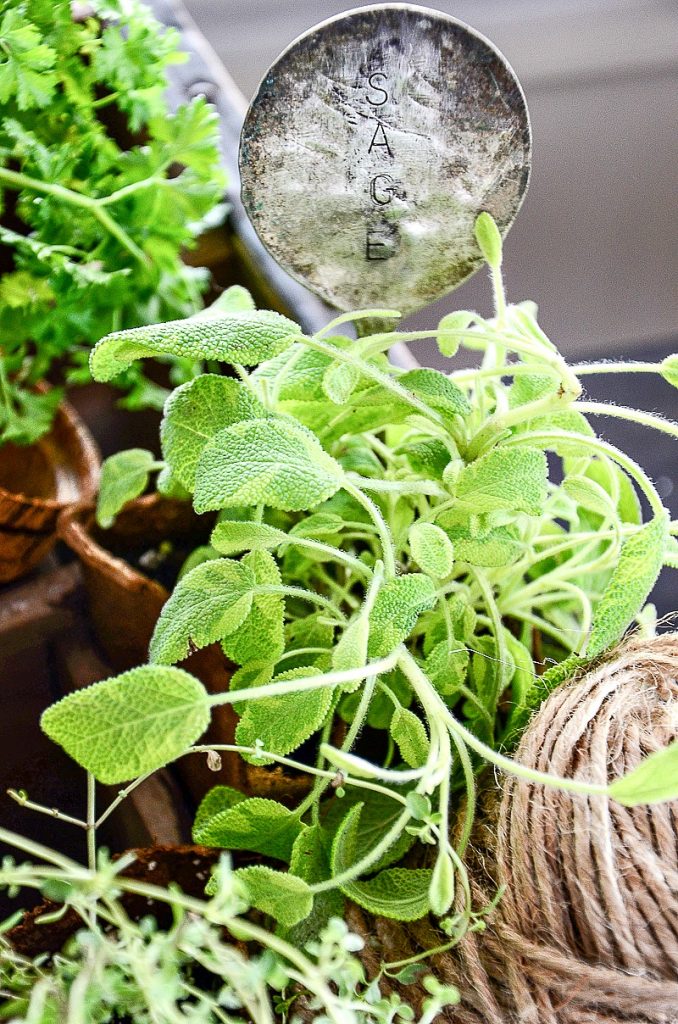
Here are a few…
- mint
- rosemary
- chives
- garlic chives
- lavender
- lemon balm
- bee balm
- sage
- thyme
- tarragon
- oregano
Pinch the leaves of the top of the plant back so they will not flowers. Many herbs get a bit bitter once they have flowered.
I plant an herb garden every year. And over the years I have this art down to a bit of a science.
You might like to see HOW TO GROW A KITCHEN HERB GARDEN
Also see, HOW TO GROW A KITCHEN HERB GARDEN IN A BASKET.
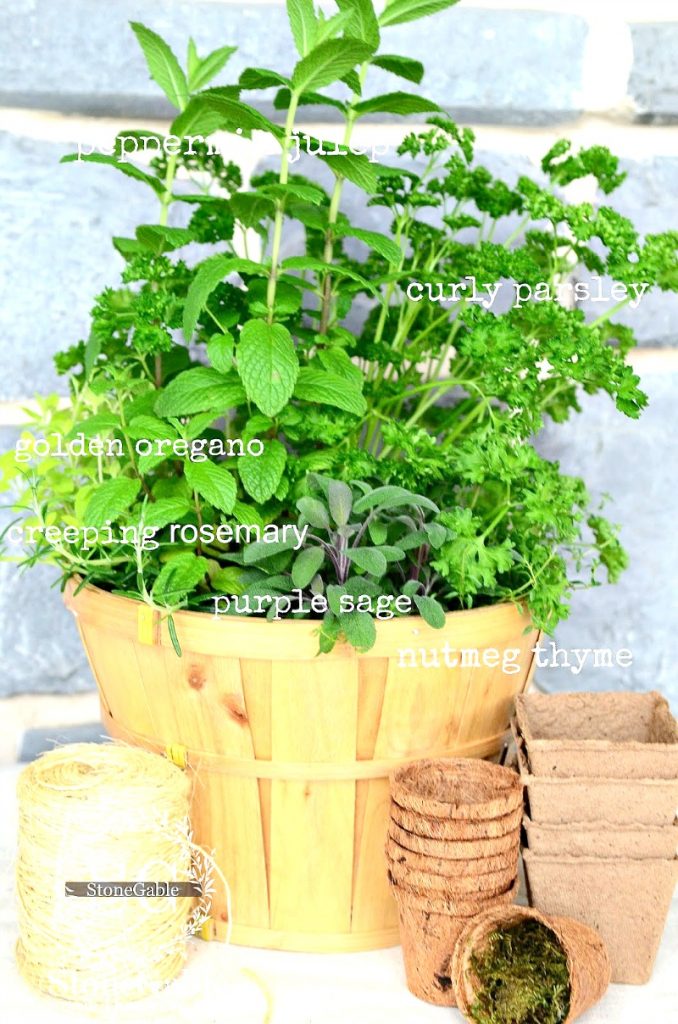
Did you know you can start a kitchen herb garden indoors? See INDOOR KITCHEN HERB GARDEN HERE.
PLANTS THAT SHOULD BE PLANTED ALONE
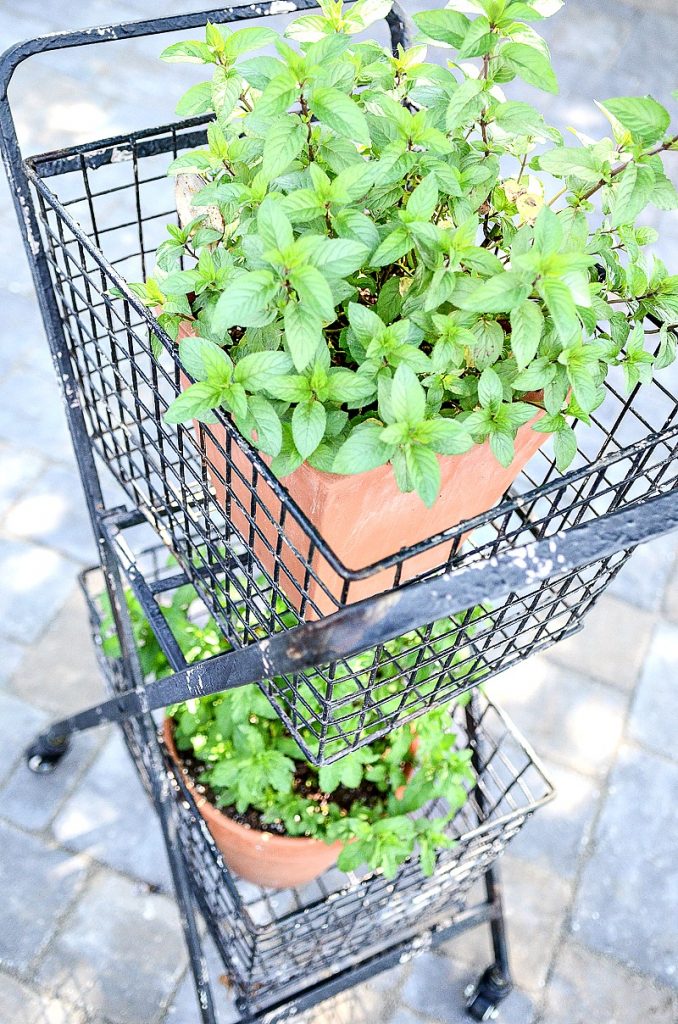
Some plants can be a bit of a bully! They are invasive and will take over a container before the season is done!
And some plants just do better on their own. Here are a few plants that work well in their own pots…
- mint
- nasturtiums
- dill
PERENNIALS
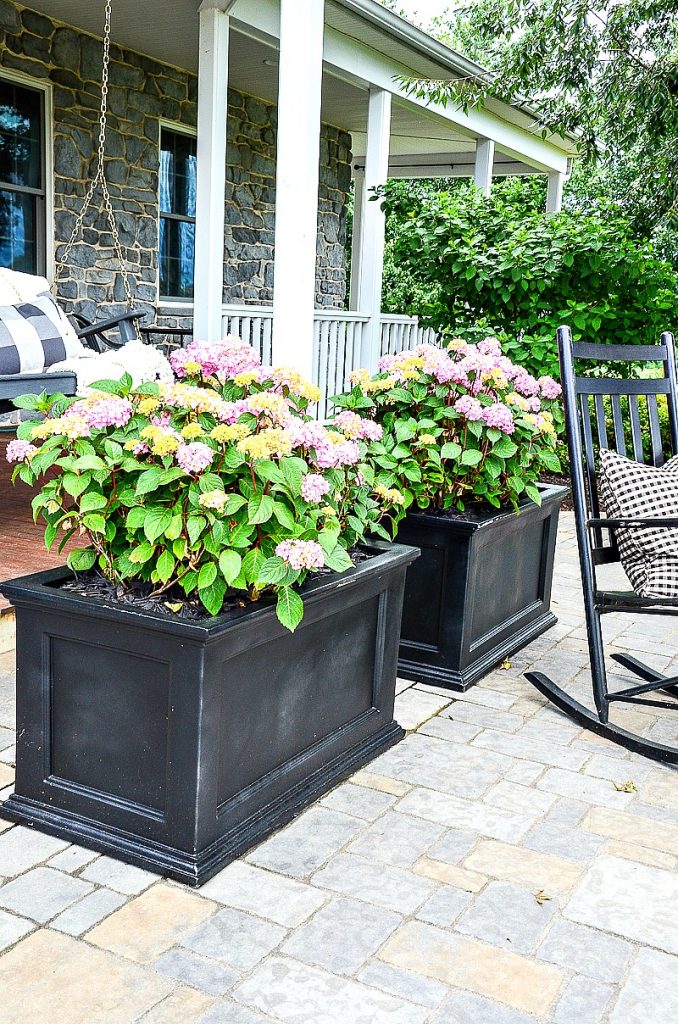
Perennials are plants that return year after year. Most of the time they have a short flowering season.
However, there are exceptions. My favorite container gardening perennials are hydrangeas. But not just any hydrangeas, I choose the ever-blooming type.
They keep producing those beautiful moppy heads of florets all season long!
But many perennials can thrive in garden containers.
THINGS TO REMEMBER WHEN PLANTING PERENNIALS
Here are some helpful things to remember when planting perennials in container gardens…
- Chose perennials that are clumping or mounding types of plants. Spreading plants will quickly outgrow their containers.
- Plant them into the soil to their crown- where the roots meet the plant
- Winterover in a garage if possible, watering about once every two weeks.
- When wintering over outdoors it is really hit or miss. Move the planter to an area protected from the wind.
Our container planted hydrangeas have come back up for three years now and they are thriving! I think that is quite a miracle!
SUCCULENTS AND CACTI
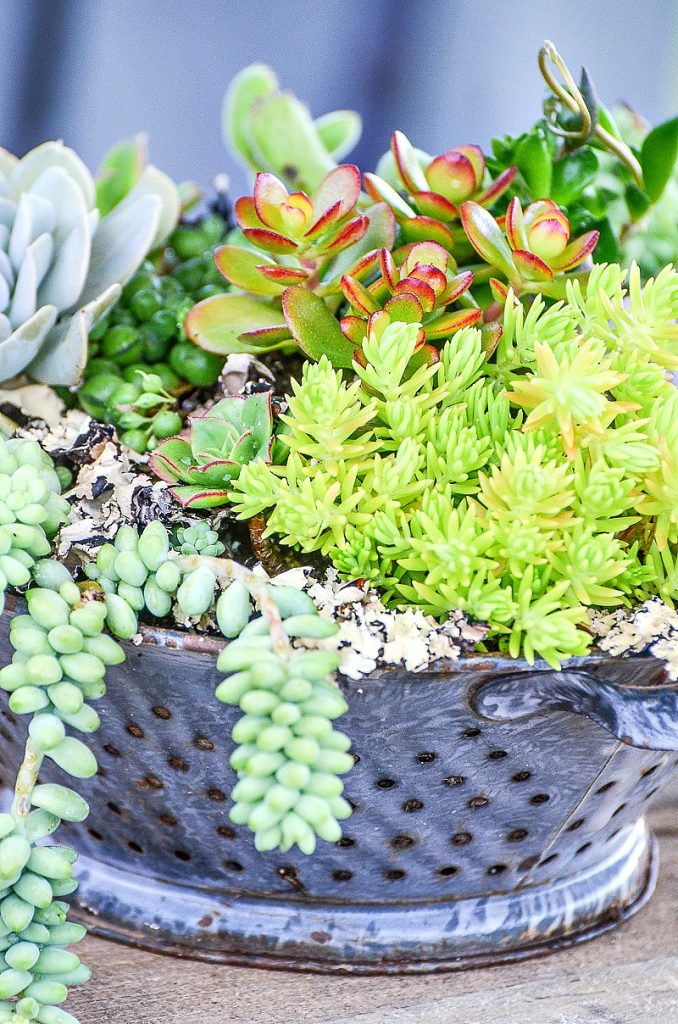
Succulents and cacti are the perfect trendy plant for a container garden. They need a soil that will drain water very quickly. My best advice it to buy a special potting soil mix especially for succulents or cacti.
Both succulents and cacti have VERY shallow roots and their leaves are delicate because they are heavy and swollen with water!
Succulents enjoy being cozy together in a shallow pot.
You can read more HOW TO PLANT SUCCULENTS HERE.
And HOW TO CARE FOR SUCCULENTS ONCE THEY ARE PLANTED HERE.
You might also like HOW TO USE SUCCULENTS IN DECOR HERE
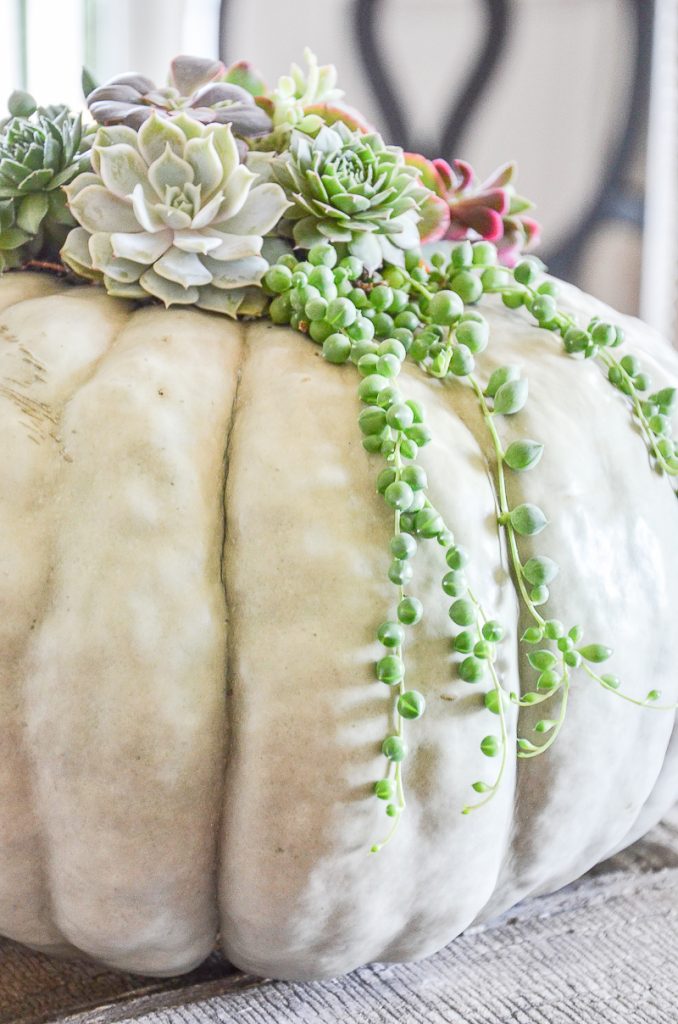
Here is a beautiful and very novel way to use a pumpkin as a container for a succulent garden… HOW TO CREATE A SUCCULENT TOPPED PUMPKIN
When fall is waining into the next season just replant the succulents into a shallow container and use them indoors.
EDIBLES
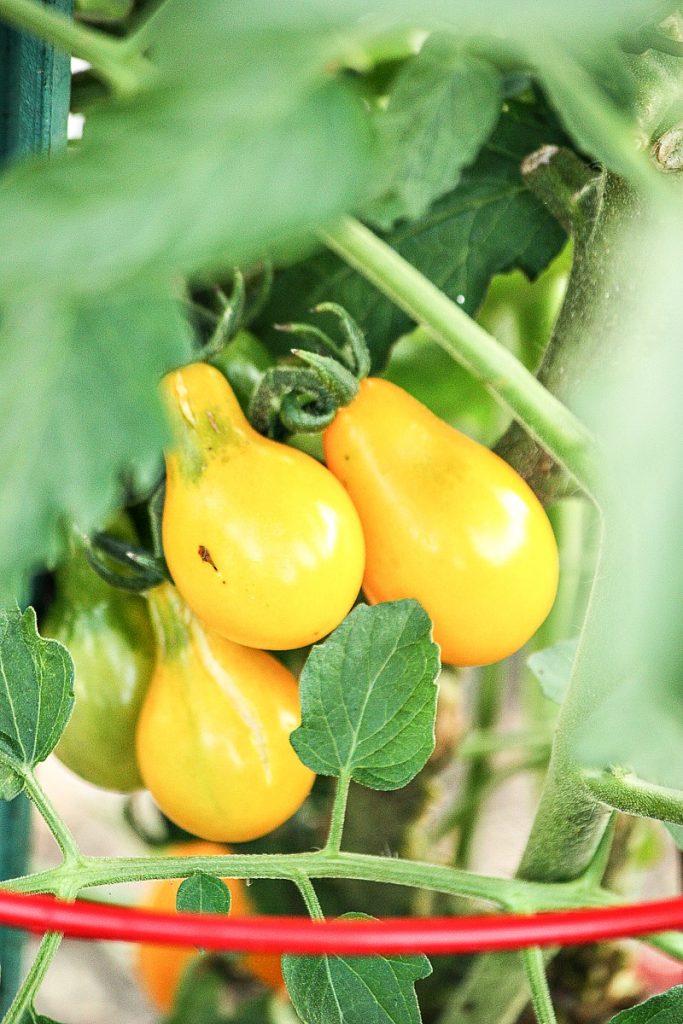
Edibles, such as tomatoes and strawberries are happy and productive in a container garden.
Bobby and I have planted so many veggies on our patio in a container. And they love “container life”!
Just make sure the container for your edibles is the right size! Many times a bit bigger is better when it comes to a pot for patio veggies. And use an organic potting soil mix.
Here are some big container gardening producers for the beginner…
- tomatoes, particularly the cherry tomato varieties
- potatoes ( we love to plant potatoes on our patio)
- lettuces and spinach
- beans
- carrots
- pepers
- eggplant
- raddish
- green onions
- beets
- cabbage
- cucumbers
Harvest your container garden vegetables when they are on the small side but ready. Especially the lettuces.
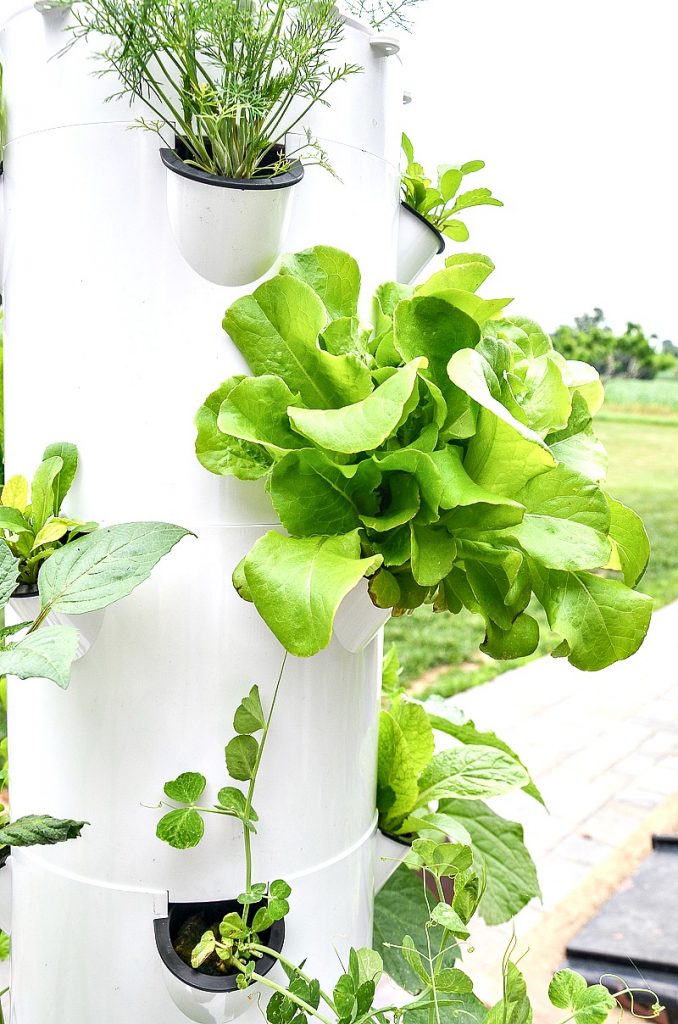
Many fruits do well in a pot. Especially berries. Just makes sure the birds don’t get to them first!
TREES AND SHRUBS
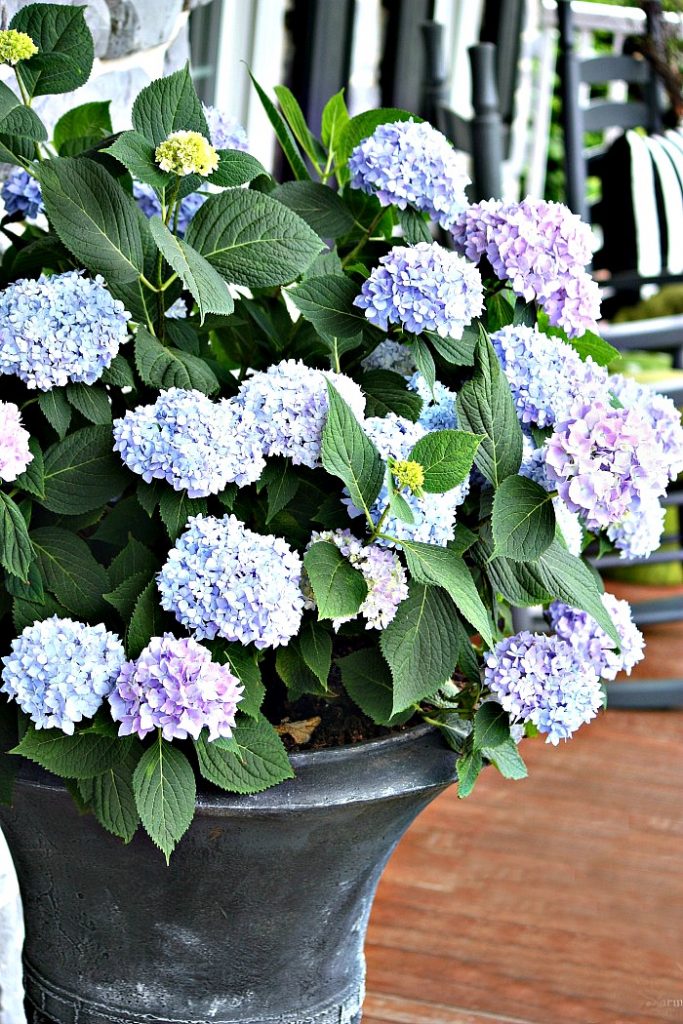
The best kinds of trees to grow in containers are dwarf trees. They will not so easily outgrow their pots or topple them over.
Look for “patio varieties”.
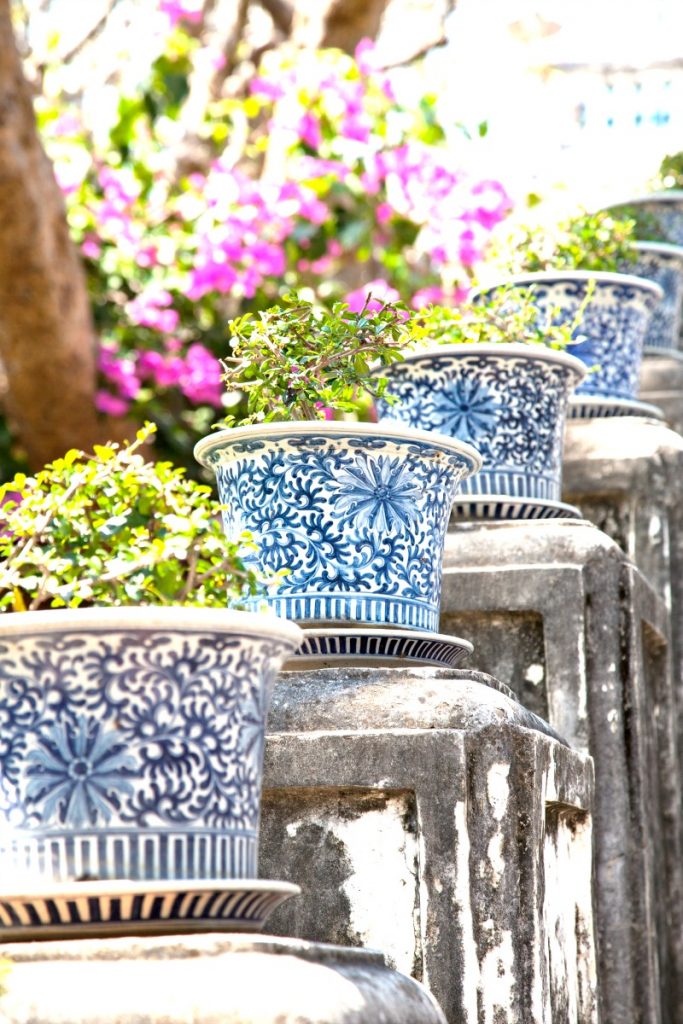
Here are the most popular trees to grow in an outdoor pot…
- citrus trees
- conifers- evergreens
- edible fig trees
- olive trees
- more
It’s very important you grow trees that are in your temperature zone. If you live in an area that gets frost outdoor trees planted in containers will usually last one season.
ARCHITECTURAL ELEMENTS
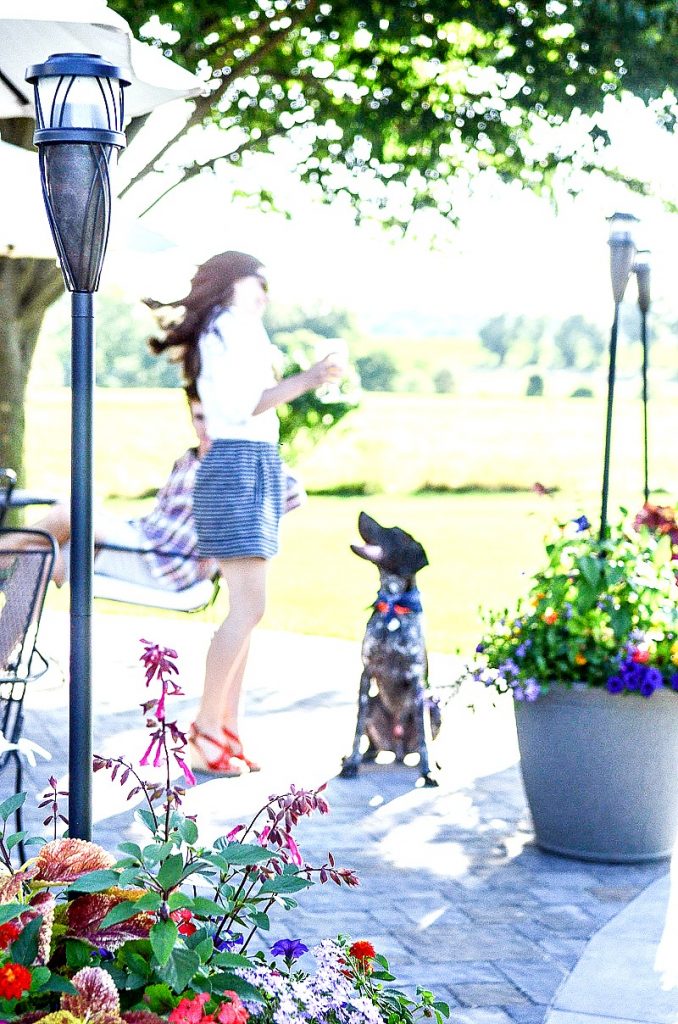
Adding an architectural element to a pot is a fun and unexpected addition to any container garden!
Think about things like an obelisk or birch log for height. or something quirky that shows off your personality!
I have a pair of huge architectural orbs I’m using in the planters on either side of my front door. They make such a statement!
GARDEN MARKERS
Garden marker not only work to identify plants but to bring an interesting element to a container garden!
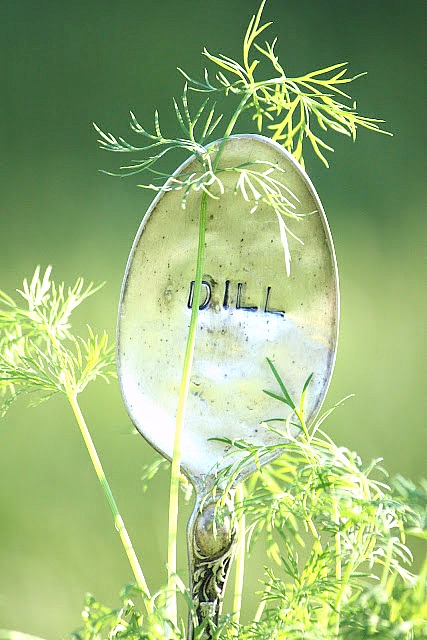
See SILVER SPOON GARDEN MARKERS DIY HERE.
And TWIG GARDEN MARKERS DIY HERE.
HOW TO PLANT A CONTAINER
Now it’s time to choose our plants and create a container garden!
PLAN OUT YOUR CONTAINER GARDEN
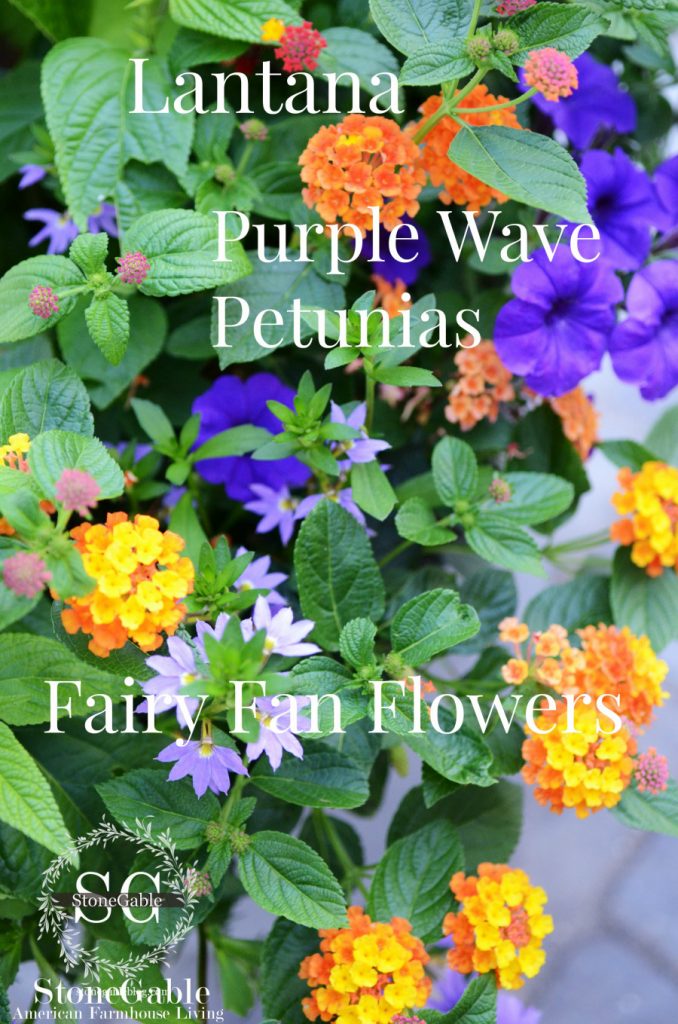
It’s important to plan out a container garden especially if it has more than a couple plants in it. Or if you are using multiple containers with the same plants for a WOW factor look!
Remember to save all your plant tags and take pictures of them so you will have them again if you like them and want to use them in the future.
Take pictures of each plant’s location in the container and snap a picture throughout the growing season. This is a wonderful record of what plants look best together and do well! And those who don’t too!
I like to pick a theme for each year’s plantings. The year my daughter got married my container garden theme was called Bridal Veil. All the plants were white and a very soft pink. Another year when my Son joined the Armed Forces I called my theme: A Salute To The American Soldier and of course it was red, white and blue.
My favorite theme was Cacophony! All the flowers were bright colors!
Choosing a theme or color palette makes sure all the container gardens you create each year look cohesive!
CHOOSE PLANTS THAT PLAY TOGETHER NICELY
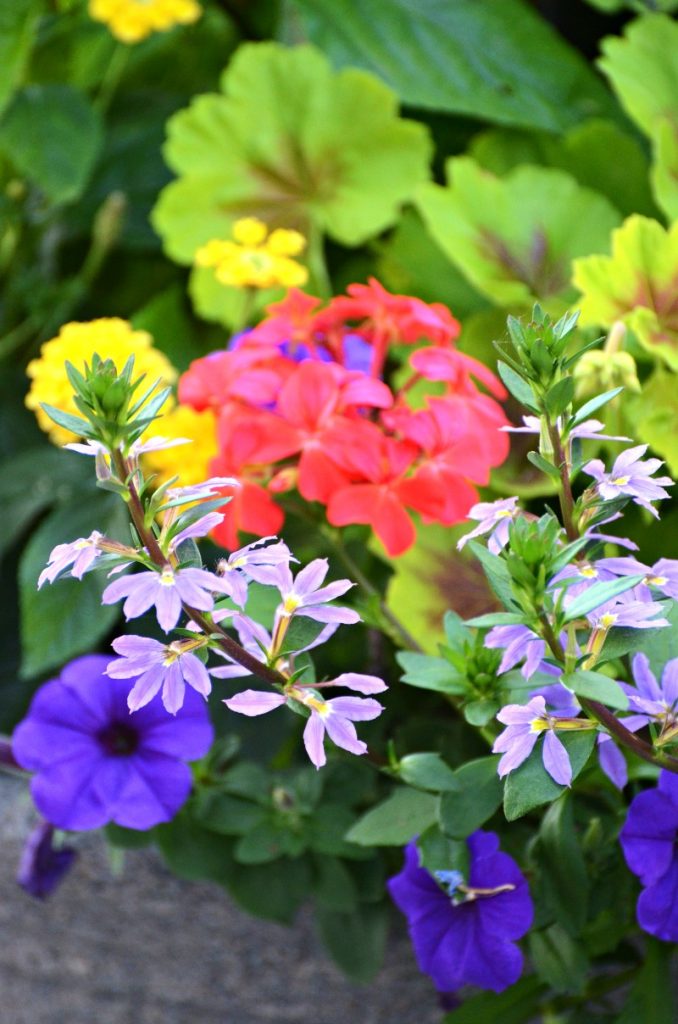
Always pick plants that tolerate the same amount of sunlight and water. And plants that are in the same zone.
Like I said above, choosing a theme or color palette for the outside container gardens around your home will ensure they look nice together!
HELP THE ROOTS
After you take a plant out of its original nursery pot gently loosen up the roots. This will let them spread out into their new container environment and be healthy.
FILL BUT DON’T OVERCROWD
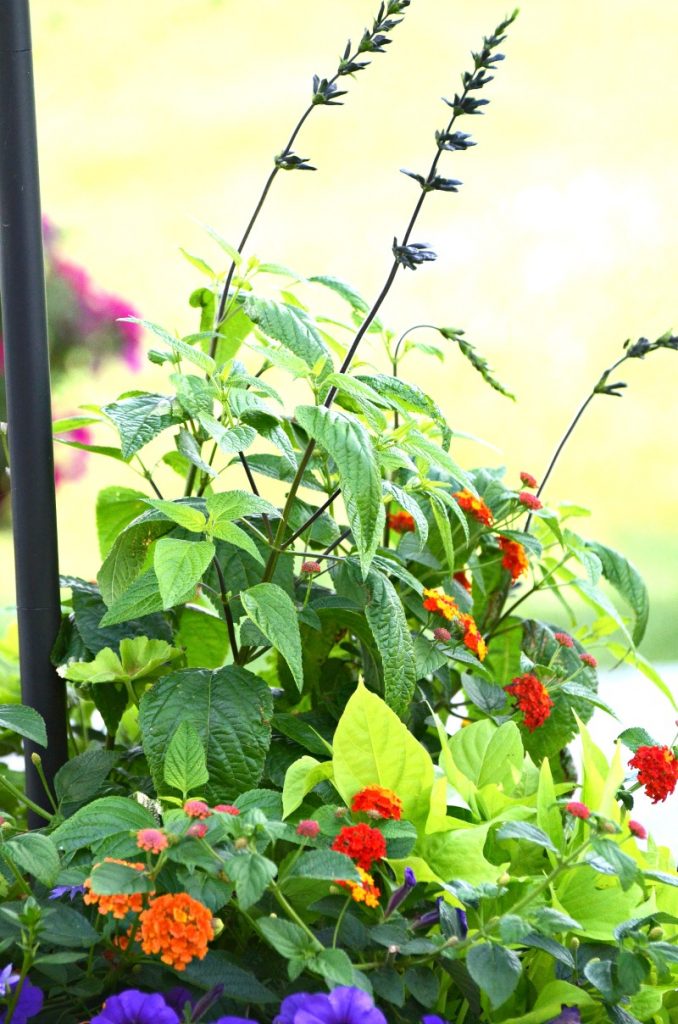
Fill a pot with flowers or herbs or edibles but don’t crowd them! They need a little room to spread and grow. If they are planted too closely together (with the exception of succulents) they languish!
FOOL-PROOF CONTAINER GARDEN DESIGN
Now that you have the perfect container and soil and maybe architectural element and plan and colors for your container garden make sure you have the perfect plants.
Here’s such an easy-easy, tried and true formula for a pretty pot!
FILLER + SPILLER + THRILLER
Remember this formula and your pots will look gorgeous!
FILLER
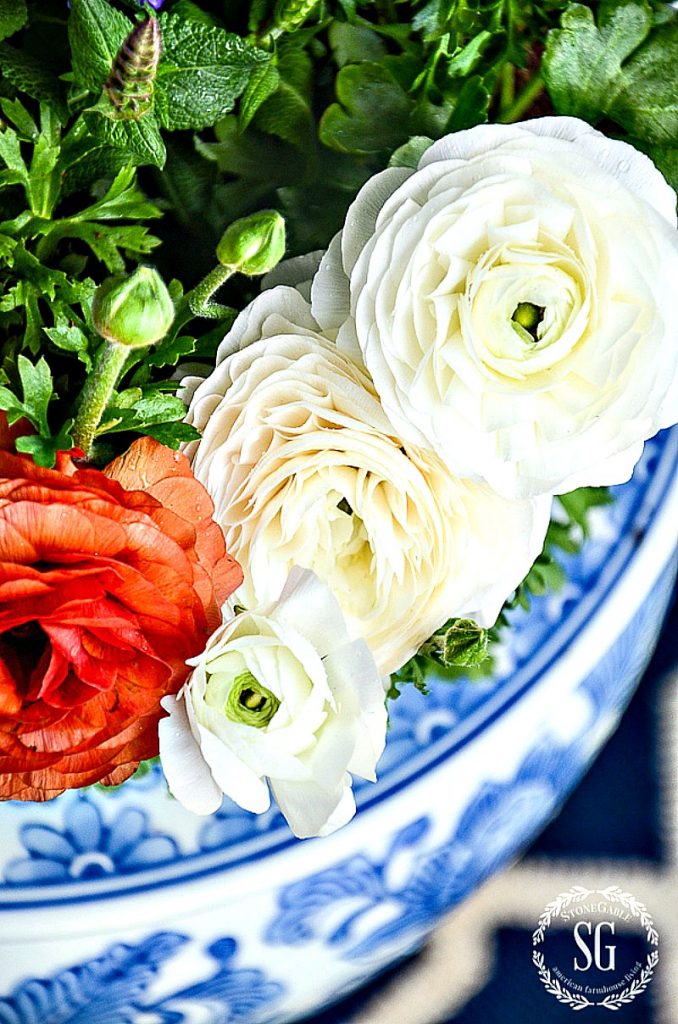
Filler plants are those that actually fill the body of the pot. They are often round or mounding plants and stay within the pot itself. They are the backbone of a pretty pot!
Here are some common fillers…
- begonias
- mini zinnias
- coleus
- geranium
- moonbeam coreopsis
- begonia
- lantana
- dusty miller
- cosmos
- dracaena
SPILLER
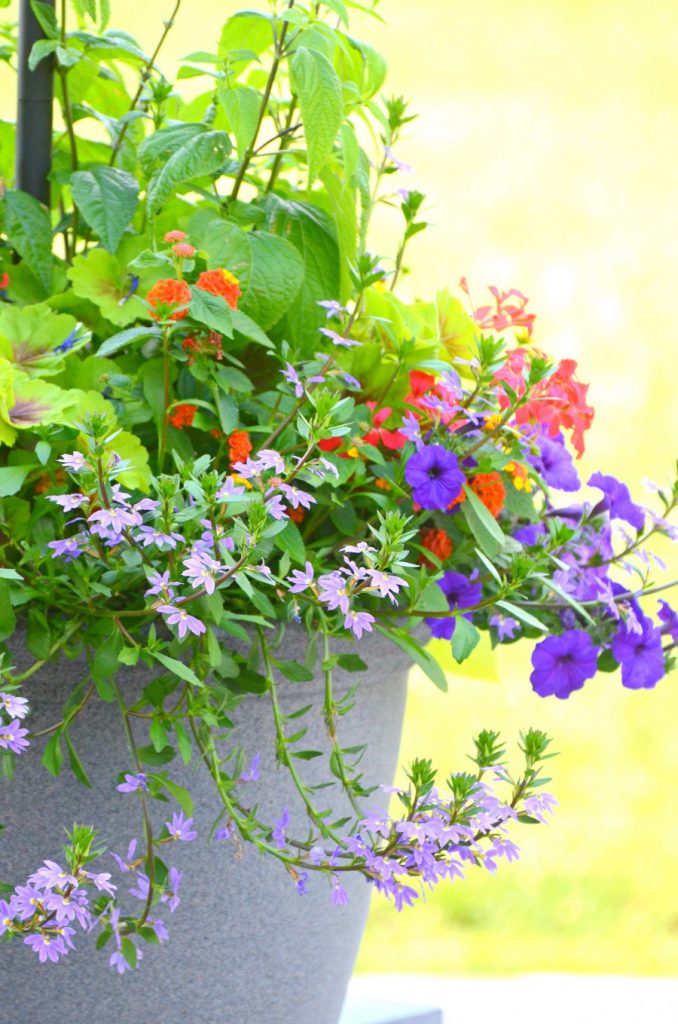
A spiller does just that! It spills over a container and softens it by hiding its edges. And a pot with spiller plants looks bigger as well.
Spiller plants are planted around the perimeter of a container so they can flow over the edge of it.
Here are some pretty examples of spiller plants…
- sweet potato vine
- fairy flower (purple flowers in pot above)
- wave petunia
- vinca vine
- ivy
- sweet alyssum
- trailing snapdragon
- million bells
- creeping zinnia
- candytuff
THRILLER
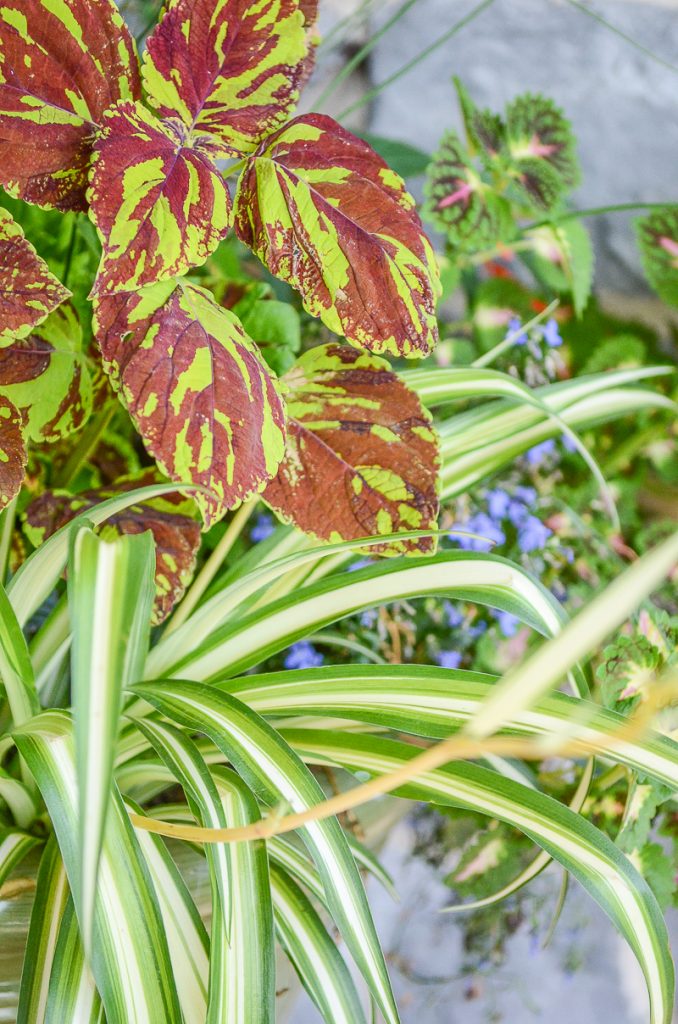
The thriller is the star of a container garden! It should be tall and showing and the first thing noticed! Thrillers are tall plants that give vertical height to a container.
A thriller is planted in the center of a pot for a 360 degree view. Or in the back center of a pot if the container garden is viewed from the front.
Here are some examples of thriller plants…
- cannas
- coleus
- salvia
- butterfly bush
- lavender
- lily of the nile
- fountain grass
- ti plant
- caladium
CARING FOR YOUR POTTED PLANTS THROUGHOUT THE SEASON
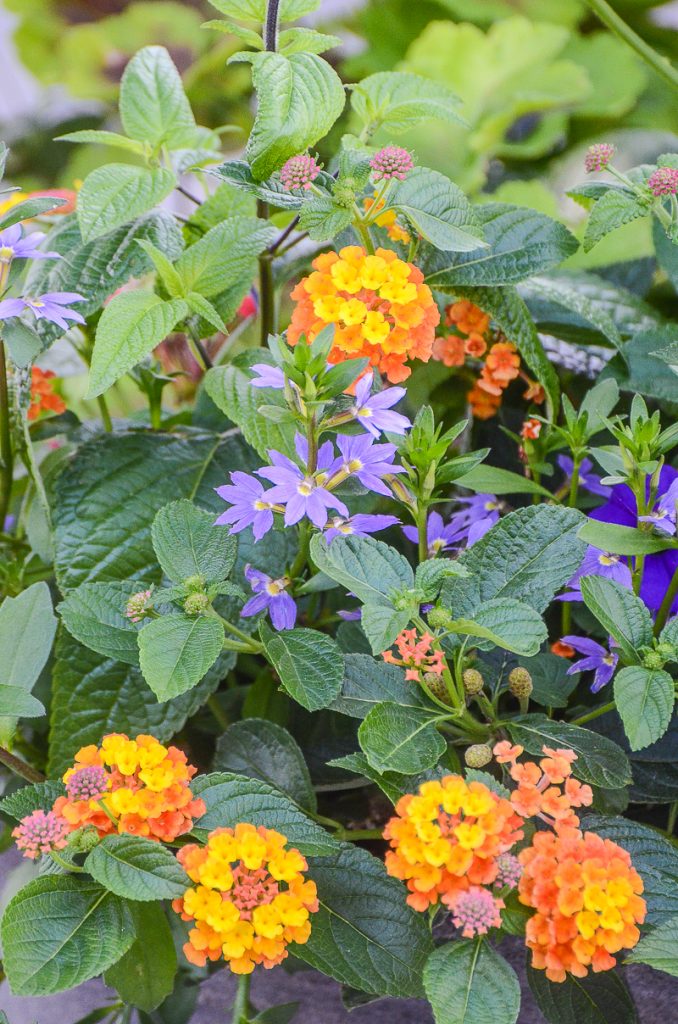
Now, that you have a planted container garden it will give you a whole season of beauty and color with just a bit of care.
FEEDING
Feeding the plants in container is the easiest way to guarantee growth and blooms.
Makes sure to use the right fertilizer for the right plants! It makes a difference! Follow the directions on the fertilizer exactly.
I use a potting soil that has fertilizer already in it so I don’t need to fertilize the entire season!
PRUNING AND PINCHING BACK
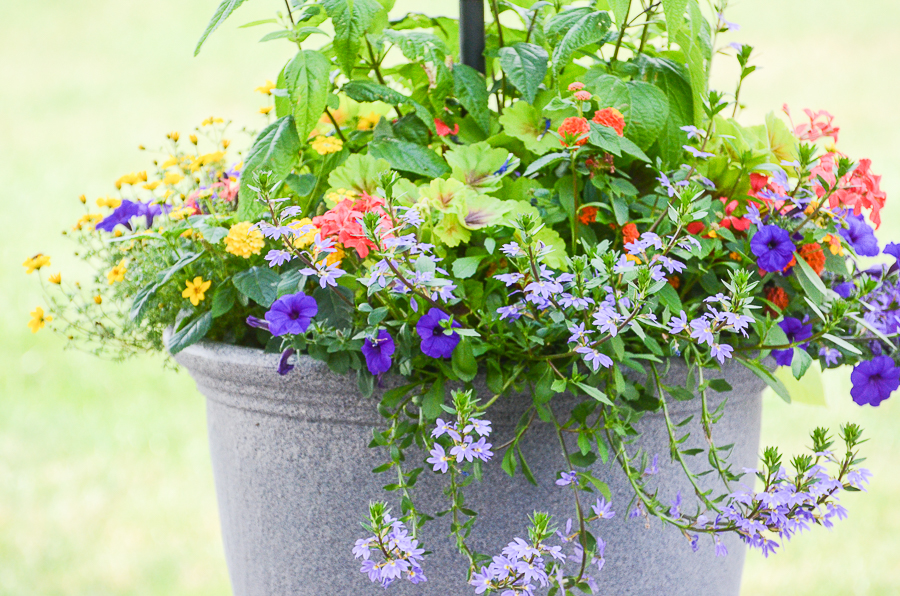
As flowers are spent pinching them off and deadheading will encourage new growth.
As the summer heats up many plants begin to languish and get leggy. Pinch them far back so they will produce new, healthy growth.
WATERING
Water your container garden according to the needs of the plants in it. It is important for most container gardens that they get a good soaking so the roots of the plants can grow deep.
Take a clue from the plants in a pot. If the leaves and flowers begin to droop they need a good watering. If the leave begin to turn yellow they might be overwatered.
Keep container gardens happy by regular watering.
A good soaking rain is the best way to water a pot. I keep track of the weather and water my pots often during a dry spell and let them dry out when it’s particularly rainy!
SELF WATERING CONTAINERS
There are many self-watering pots and hacks to keep a container garden perfectly watered all season long!
I have several pots of this type and they are my favorite! I add water to a reservoir and as the soil drys out the water in the reservoir is released.I just keep checking the reservoir of water to refill it when needed.
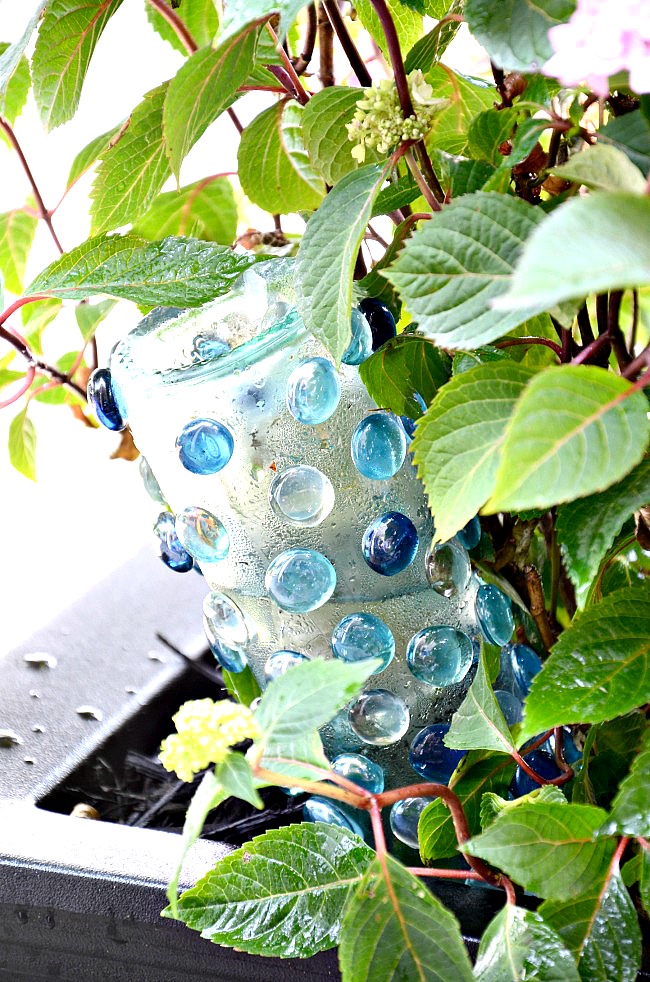
If you need a little help water pots that are not self-watering try a self watering plant stake. They are a great way to water plants when busy or away!
Here is a fun and very easy WINE BOTTLE WATERING STAKE DIY that is not only a pretty accent to a garden but a watering babysitter too!
PESTS
Container garden plants most often enjoy a pest free life if healthy plants are potted in good, clean potting soil.
Any sign of a plant being diseased or dying pull it out of the pot and replace it with a healthy one.
REPLACING PLANTS
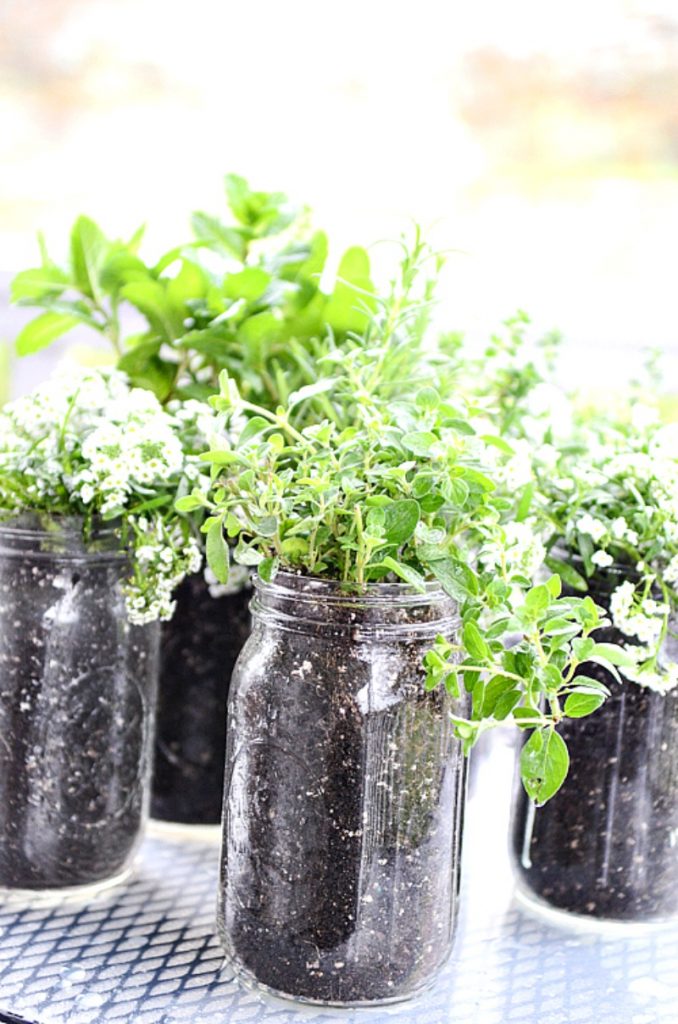
One nursery trick I love is to replace plants that are not doing well in a container garden with new healthy plants!
About the end of July here at StoneGable, my potted petunias begin to look very tired! I will often replace them with healthier plants from my local nursery.
I love planting herbs in ball jars and as I cut and use them I replace them. So easy and the herbs stay happy!
You can see how I plant HERBS IN MASON JARS HERE.
And see HOW TO FREEZE FRESH HERBS. Like most summer edibles herbs seem to produce a bounty all at once. So instead of my herbs going to waste I freeze them so I’ll have fresh herbs all year long! So easy!
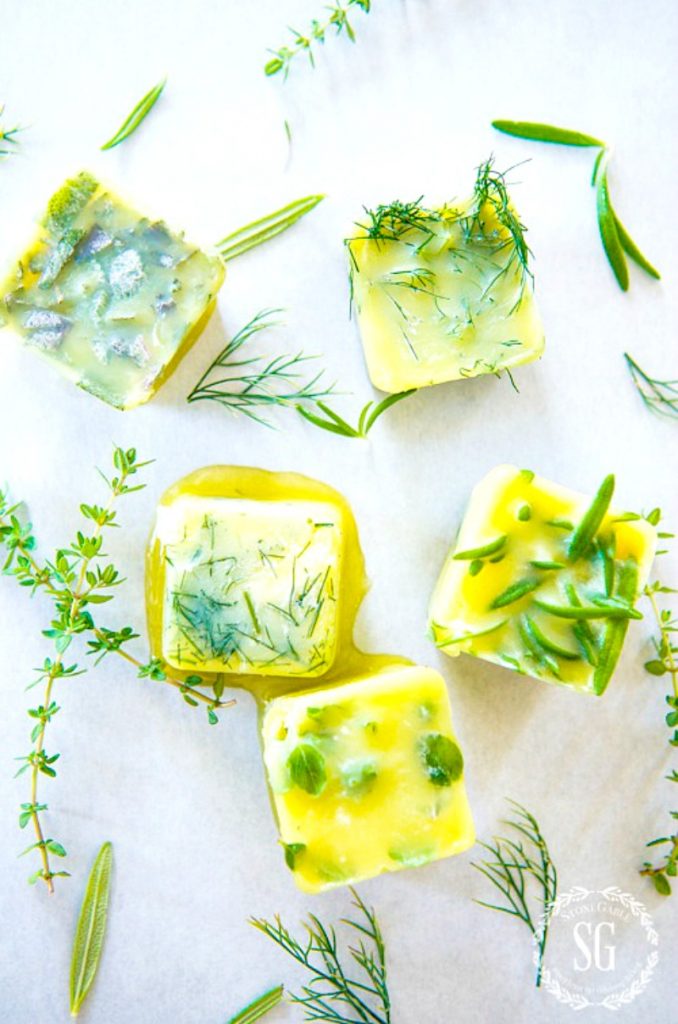
CHANGING SEASONS
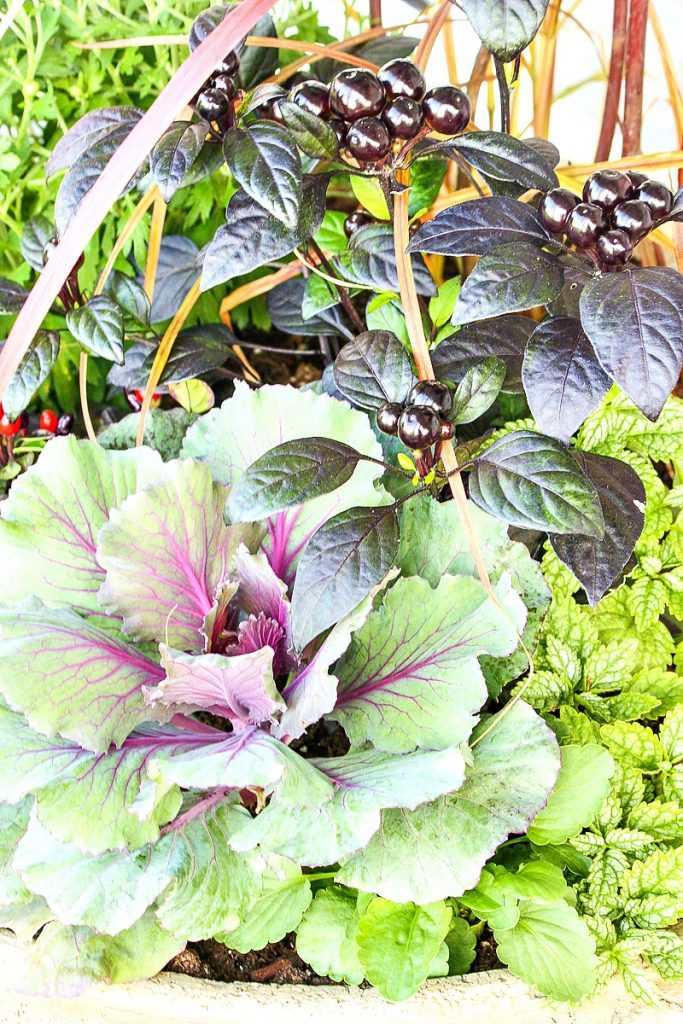
As summer turns into fall I often change out plants that have given their all and are looking less than pretty.
By pulling out the spent summer plant and replacing them with fresh fall loving plants a container garden can be enjoyed until frost.
I only pull out plants that look bad. Some of my summer plants, if I cut them back, can thrive straight through fall! And they look lovely mixed with traditional fall plantings.
Here are some pretty fall replacement plants…
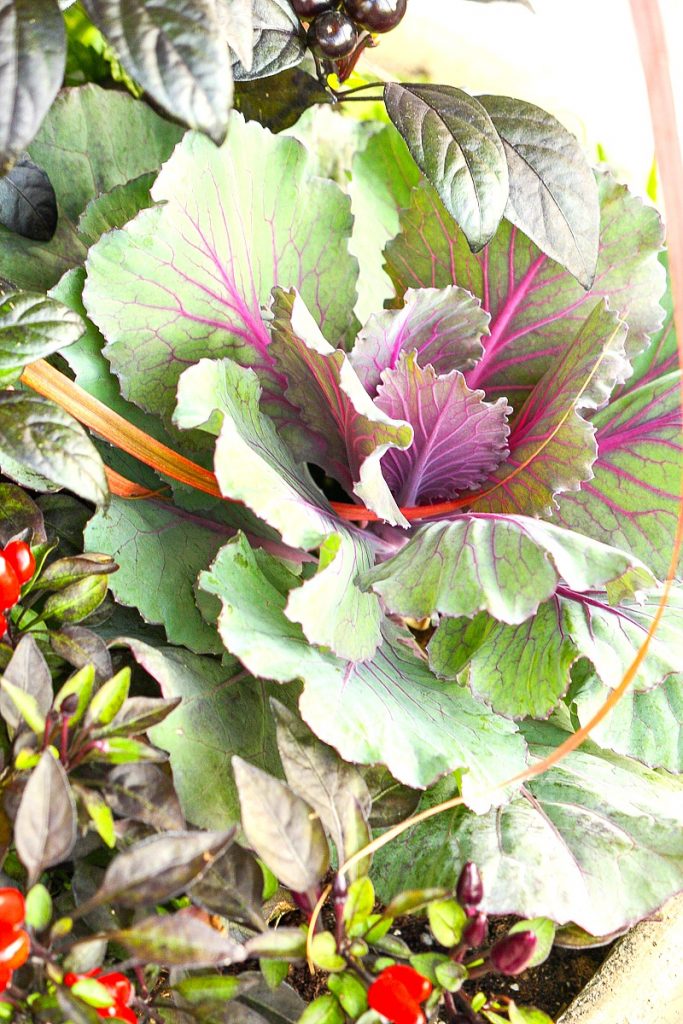
- ornamental cabbage
- ornamental kale
- mums
- ornamental pepper plant
- sedum
- pansy
- dusty miller
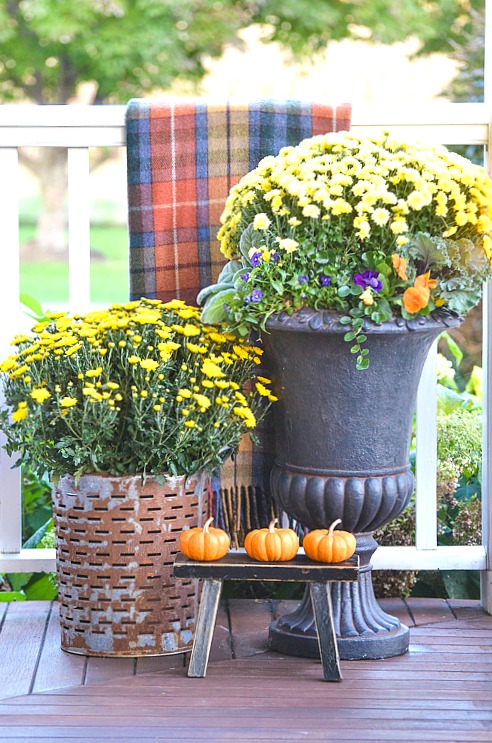
Have a nook, cranny or small outdoor space. See SMALL SPACE FALL OUTDOOR DECORATING
Also see HOW TO PLANT PERFECT FALL POTS HERE. You will love all the pretty ideas!
ADDING SEASONAL ELEMENTS
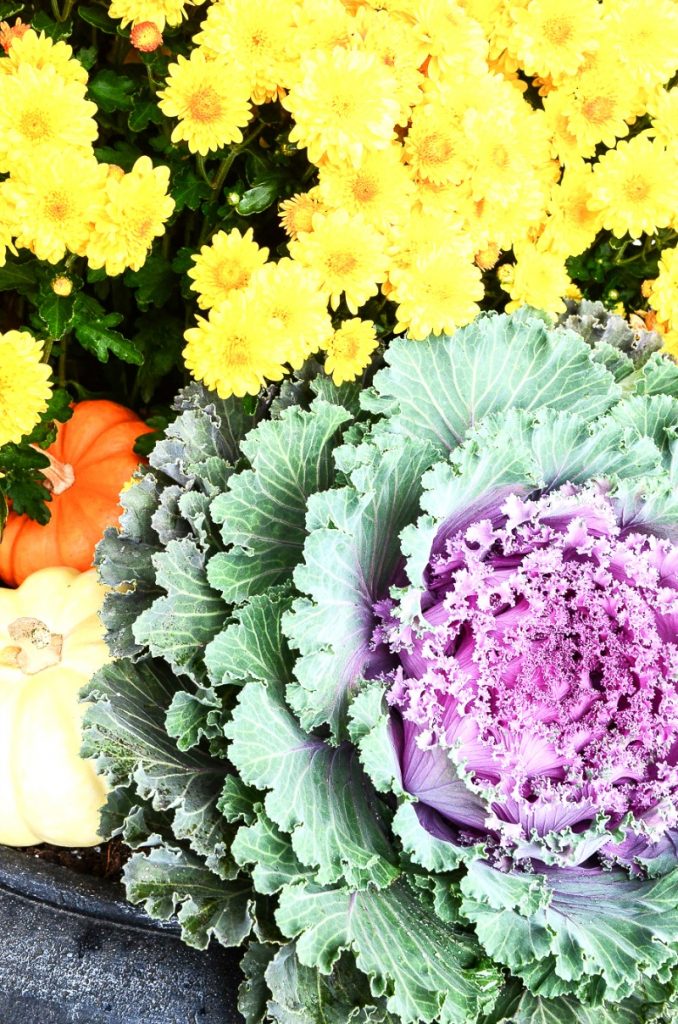
Fall is the perfect time to add a pumpkin or two to a container garden! Instead of replacing a summer plant with another plant use the space to pop a pumpkin or gourd into a container garden. Instant interest!
WHAT TO DO WITH A CONTAINER AT THE END OF PLANTING SEASON
When the growing season in your area is over there is still work to do. Let’s clean up, put away and get ready for the next growing season.
OVERWINTER
My best advice about overwintering any container garden is to follow the advice of experts and local nurseries in your temperature zone.
If you live in a four-season climate like me, to winter over a plant in a container is always chancy! My hydrangeas tend to do well but my knockout roses have not.
Some perennials can be brought into a shed or garage and do well.
BRING YOUR PLANT INSIDE

Annuals such as begonias and coleus and asparagus fern can be repotted and brought inside for the winter.
Check with your local nursery to see what plants have a good chance of surviving indoors.
Some trees, depending on your zone, can be brought inside to overwinter. Again, check with your local nursery
WHAT TO DO WITH THE SOIL IN A CONTAINER
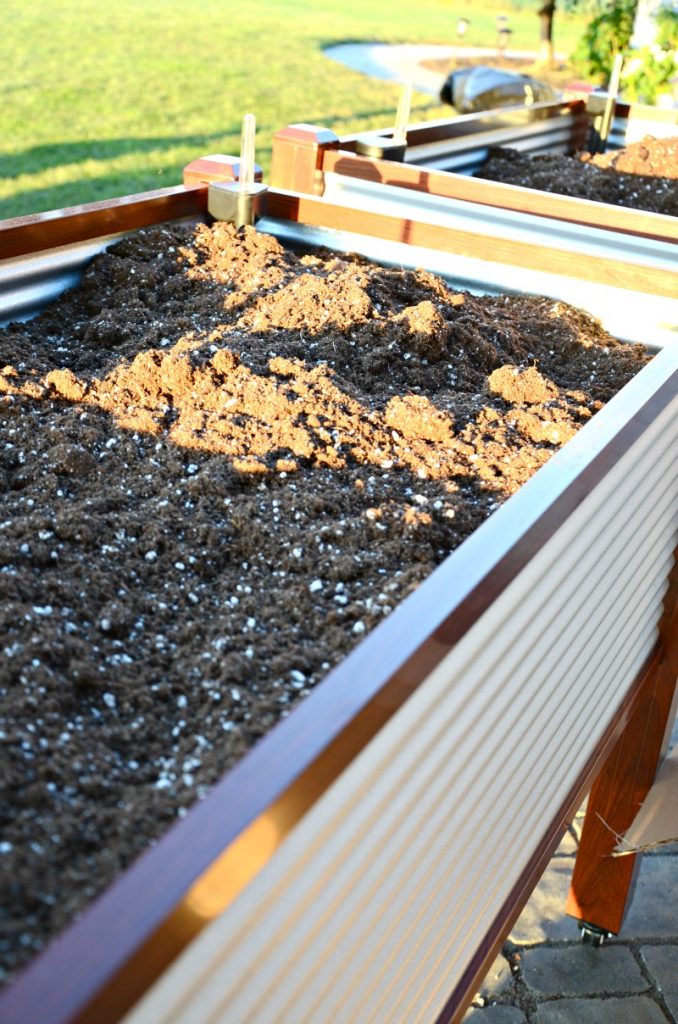
There are so many explanations about dealing with potting soil at the end of a growing season.
Here’s the bottom line. You can reuse potting soil. Here are some things to keep in mind…
- many of the nutrients in the potting soil have probably been leached out of it by the end of the season so amend the old potting soil with a good fertilizer before using again
- use one half of the previous year’s potting soil and mix in new potting soil before using
- make sure to dig up and turn over old potting soil as it has settled and can be dense before using again
- only plant tomatoes two years in the same potting soil
- throw away potting soil if the plants in the container have been diseased
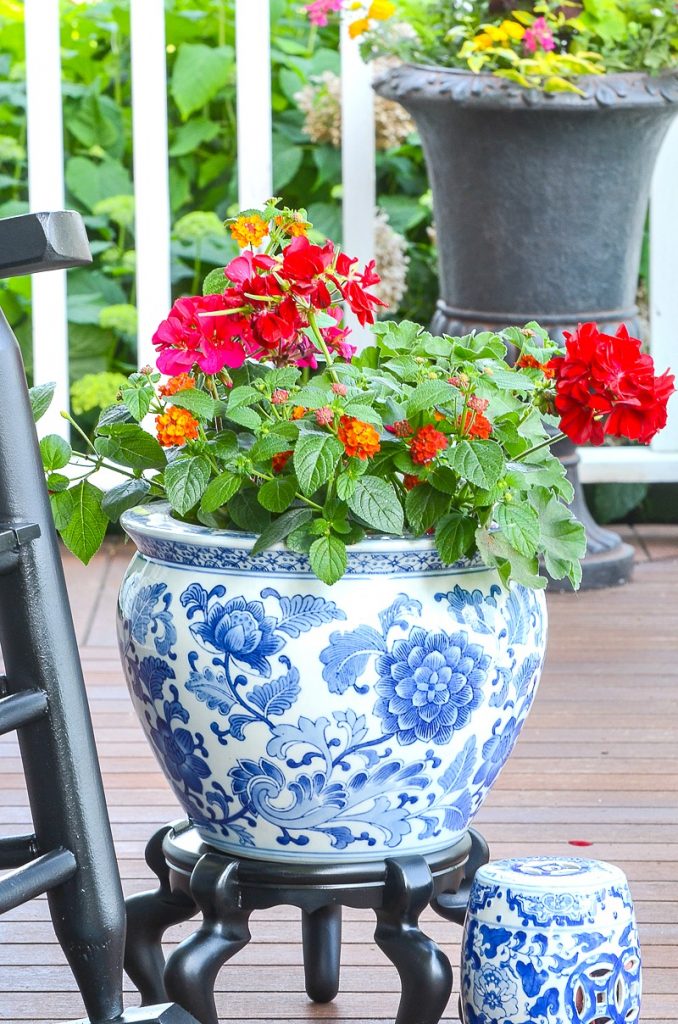
A container garden big, small or in between can give you over a season of beauty and bounty! They are easy to plant and even easier to maintain.
Enjoy!

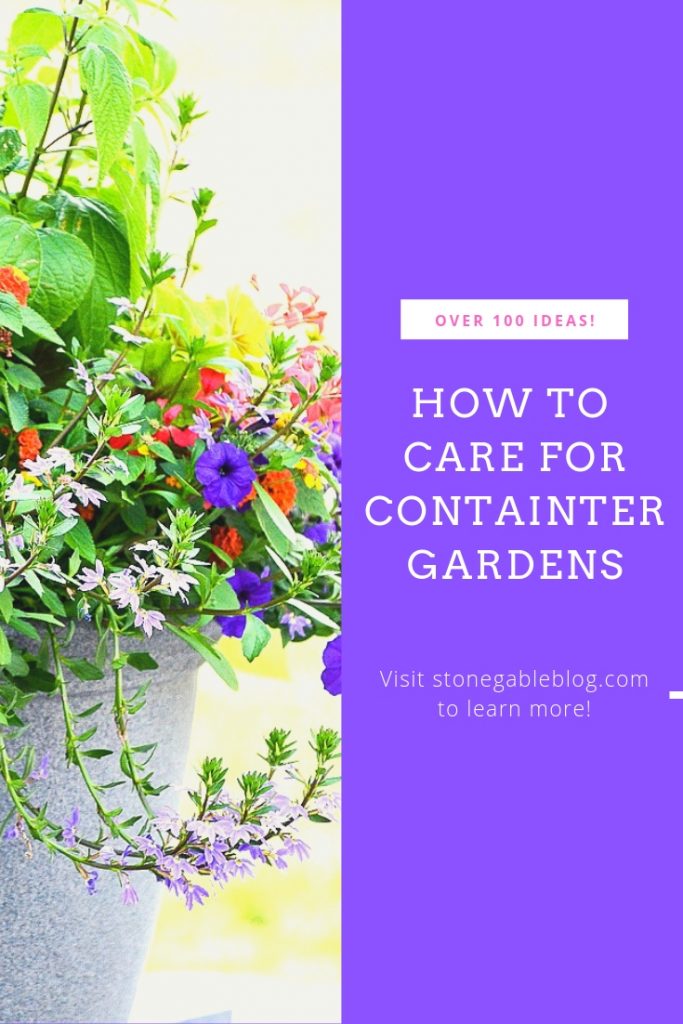

WOW, nice job. I don’t think I have ever read such a complete collection of info on container gardening. This must have taken some time to compile all this great info and I thank you so much. Have a blessed day, Sharon
I hope this is helpful!